Special Report
States Benefitting the Most (and Least) From Biden's Infrastructure Policies
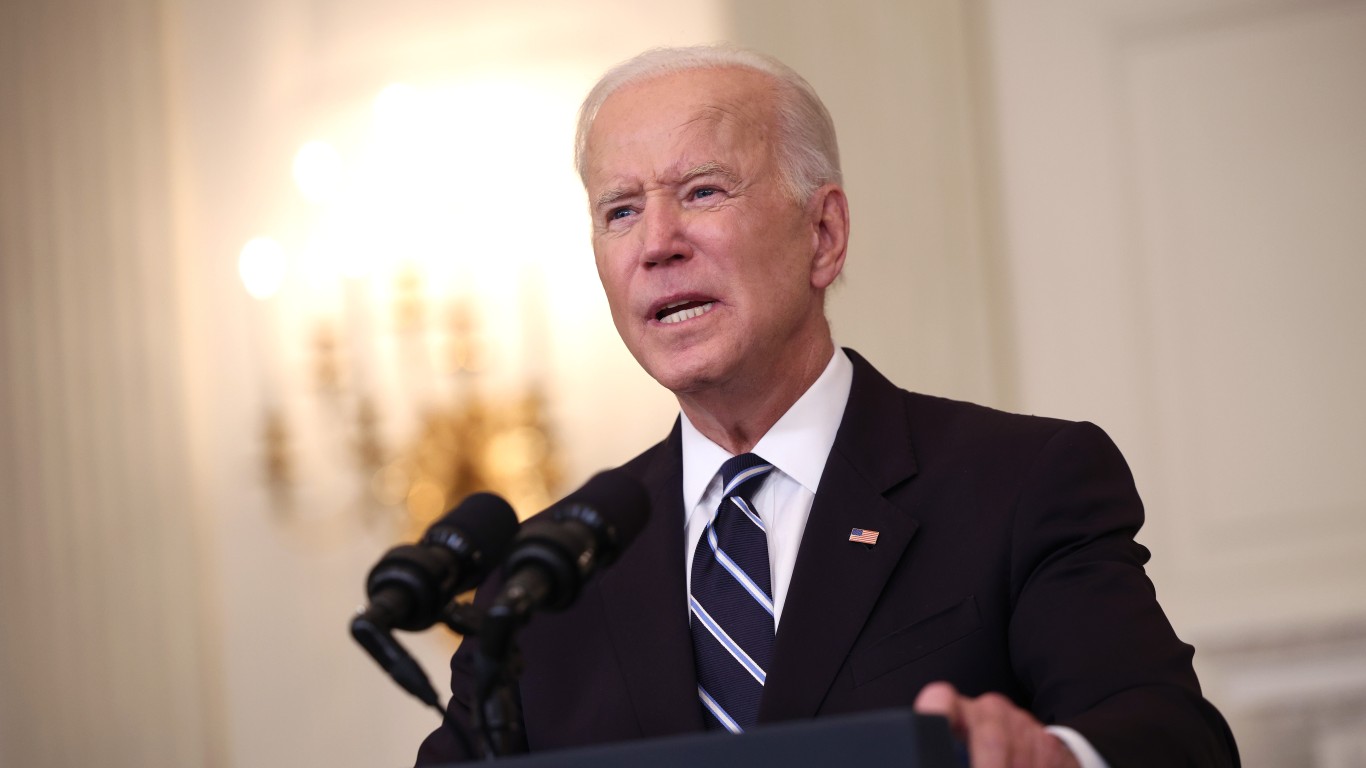
Published:

In today’s polarized political climate, few issues in Washington receive bipartisan support. Investment in the nation’s infrastructure, however, is a notable exception – and with good reason. A 2021 report from the American Society of Civil Engineers assigned U.S. public infrastructure an average letter grade of C- based on performance in 17 major categories, including roads, drinking water, transit, dams, and bridges. According to the report, the U.S. needs to invest an additional $2.6 trillion in infrastructure over the next 10 years.
To help address this shortfall, President Joe Biden signed the Infrastructure Investment and Jobs Act into law in November 2021. The bill authorizes $1.2 trillion in federal spending over a five-year period, including $550 billion in new spending to rebuild public works and transportation infrastructure. (Here is a look at Biden’s approval rating in every state.)
Much of this money will be distributed to state governments and has already been earmarked for certain projects, including bridge and highway repair, electric vehicles charging stations construction, broadband internet expansion, airport improvements, cybersecurity, and wildfire protection. While the largest states by population are the ones receiving the most federal dollars, they are not necessarily the states where federal infrastructure spending will have the largest impact.
Using federal data compiled by U.S. News & World Report, 24/7 Wall St. identified the states benefiting the most and least from Biden’s infrastructure bill. States are ranked by the amount of non-grant federal funding they are slated to receive per capita. Data on the top three investment categories in each state by total planned investment is also from the U.S. News & World Report article The States Benefiting the Most From the Infrastructure Deal.
Depending on the state, federal infrastructure investment under the bill ranges from $2.0 billion in New Hampshire to $44.6 billion in California. Adjusting for population, however, spending ranges from $887 to $6,721 per person.
While there are some notable exceptions, many of the states receiving the most federal funding per capita have large rural populations. Urban areas are more densely populated than rural areas, and as a result, every federal dollar spent in rural places directly impacts fewer people. Nationwide, about 20% of the U.S. population lived in rural areas in 2020, according to the U.S. Census Bureau. In seven of the 10 states receiving the most federal infrastructure funding per capita, over 35% of the population lives in rural areas.
In every state, federal highway aid accounts for the largest share of infrastructure investment – accounting for anywhere from 43% to 76% of all non-grant funding. Other major investment areas vary by state but often include public transit, water infrastructure, and bridge repair. (Here is a look at the states with the most bridges in poor condition.)
Click here to see the states benefitting the most (and least) from Biden’s infrastructure policies.
Click here to see our detailed methodology.
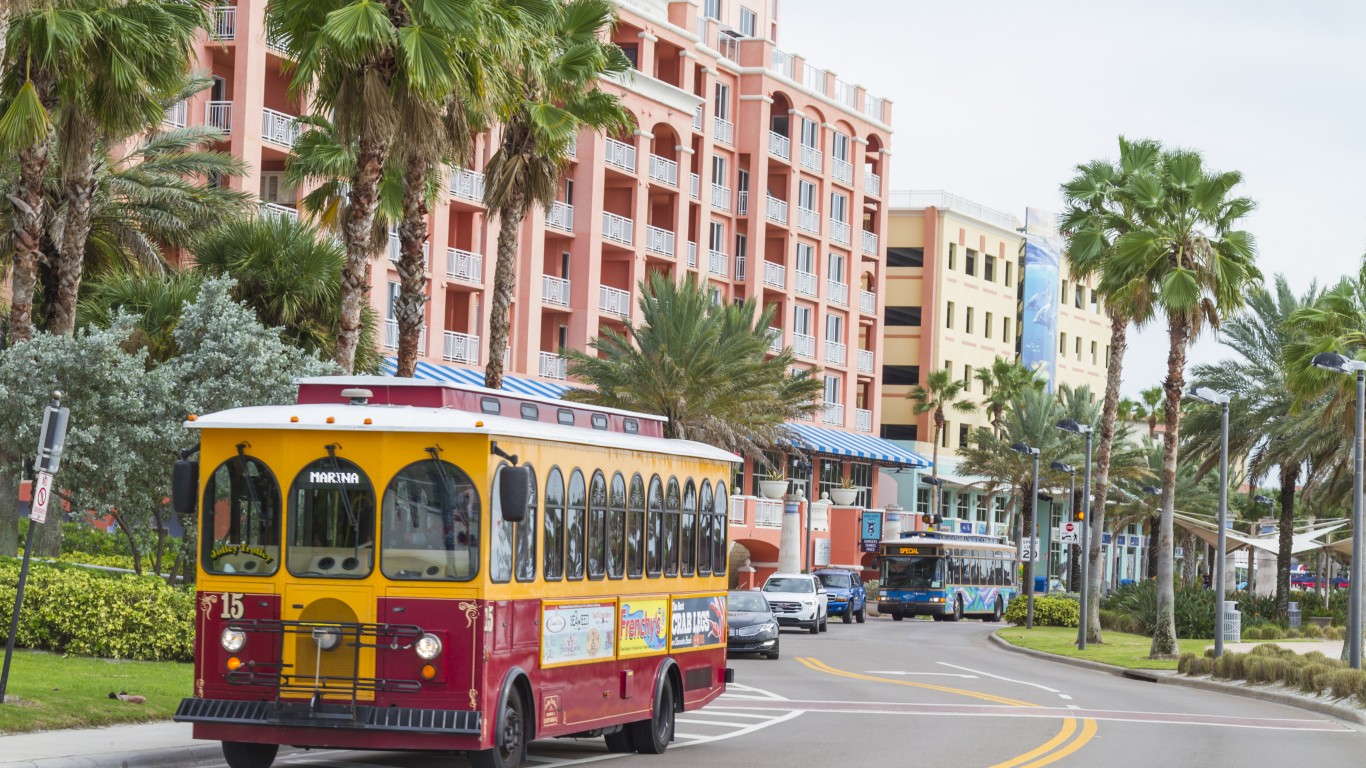
50. Florida
> Total infrastructure spending: $887 per person ($19.1 billion total – 4th highest of 50 states)
> Largest infrastructure spending category: Federal Highway Aid; $13.1 billion (68.6% of in-state infrastructure spending)
> 2nd largest infrastructure spending category: Public Transportation; $2.6 billion (13.6% of in-state infrastructure spending)
> 3rd largest infrastructure spending category: Water Infrastructure; $1.6 billion (8.4% of in-state infrastructure spending)
> Urban-rural population divide: 91.5% urban; 8.5% rural (4th largest urban pop., 4th smallest rural pop. of 50 states)
> Total population: 21,538,187 (3rd largest of 50 states)
[in-text-ad]
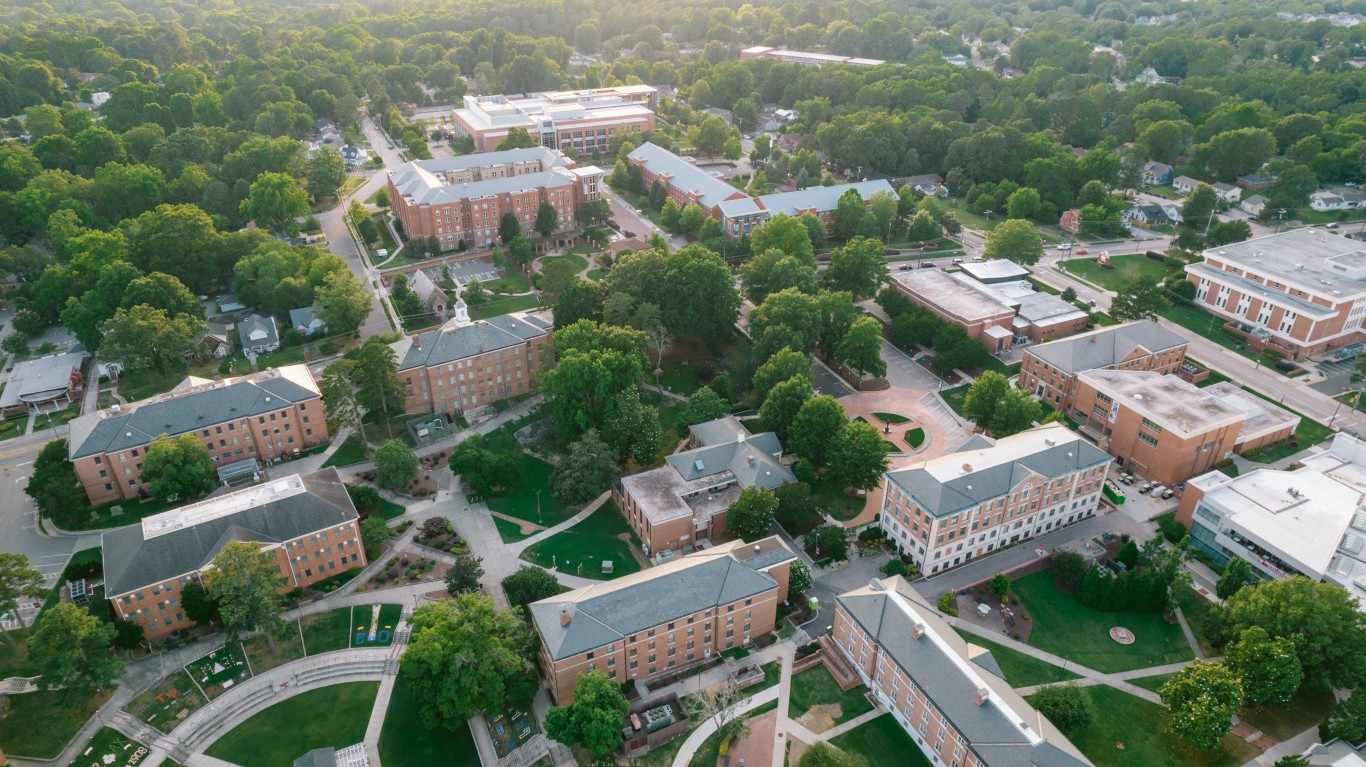
49. North Carolina
> Total infrastructure spending: $996 per person ($10.4 billion total – 11th highest of 50 states)
> Largest infrastructure spending category: Federal Highway Aid; $7.2 billion (69.3% of in-state infrastructure spending)
> 2nd largest infrastructure spending category: Water Infrastructure; $1.1 billion (10.6% of in-state infrastructure spending)
> 3rd largest infrastructure spending category: Public Transportation; $910.0 million (8.8% of in-state infrastructure spending)
> Urban-rural population divide: 66.7% urban; 33.3% rural (17th smallest urban pop., 17th largest rural pop. of 50 states)
> Total population: 10,439,388 (9th largest of 50 states)
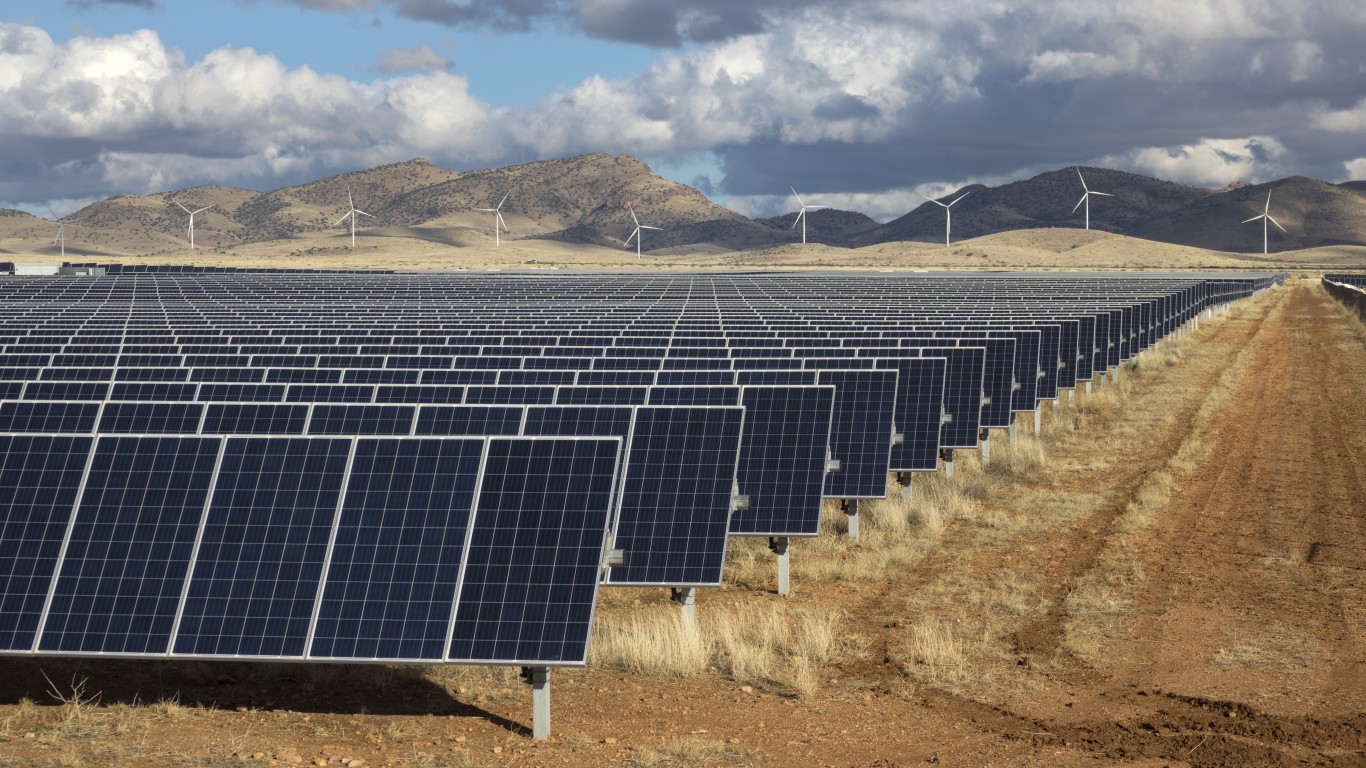
48. Arizona
> Total infrastructure spending: $1,022 per person ($7.3 billion total – 19th highest of 50 states)
> Largest infrastructure spending category: Federal Highway Aid; $5.0 billion (68.4% of in-state infrastructure spending)
> 2nd largest infrastructure spending category: Public Transportation; $884.0 million (12.1% of in-state infrastructure spending)
> 3rd largest infrastructure spending category: Water Infrastructure; $619.0 million (8.5% of in-state infrastructure spending)
> Urban-rural population divide: 89.3% urban; 10.7% rural (8th largest urban pop., 8th smallest rural pop. of 50 states)
> Total population: 7,151,502 (14th largest of 50 states)
47. Colorado
> Total infrastructure spending: $1,068 per person ($6.2 billion total – 25th highest of 50 states)
> Largest infrastructure spending category: Federal Highway Aid; $3.7 billion (60.0% of in-state infrastructure spending)
> 2nd largest infrastructure spending category: Public Transportation; $916.0 million (14.8% of in-state infrastructure spending)
> 3rd largest infrastructure spending category: Water Infrastructure; $688.0 million (11.2% of in-state infrastructure spending)
> Urban-rural population divide: 86.0% urban; 14.0% rural (13th largest urban pop., 13th smallest rural pop. of 50 states)
> Total population: 5,773,714 (21st largest of 50 states)
[in-text-ad-2]
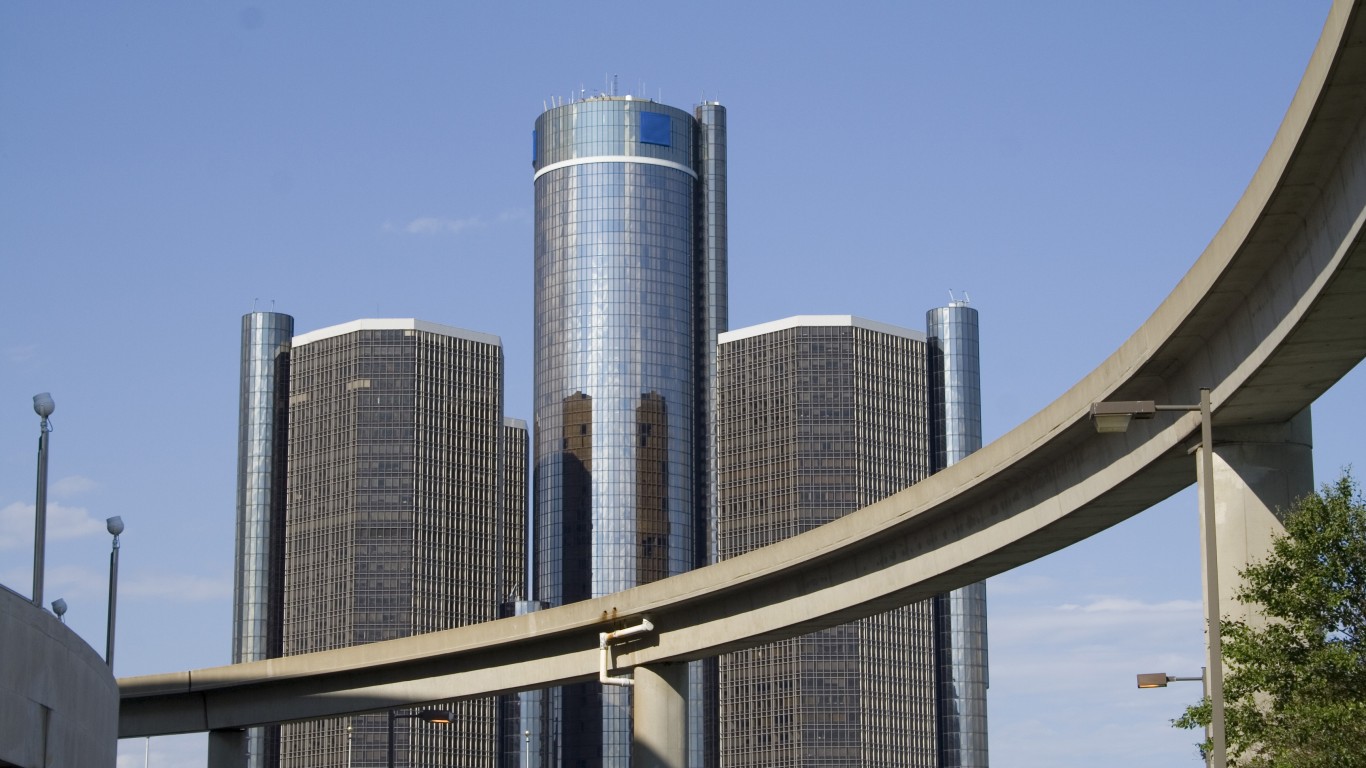
46. Michigan
> Total infrastructure spending: $1,070 per person ($10.8 billion total – 10th highest of 50 states)
> Largest infrastructure spending category: Federal Highway Aid; $7.3 billion (67.7% of in-state infrastructure spending)
> 2nd largest infrastructure spending category: Water Infrastructure; $1.3 billion (12.1% of in-state infrastructure spending)
> 3rd largest infrastructure spending category: Public Transportation; $1.0 billion (9.3% of in-state infrastructure spending)
> Urban-rural population divide: 73.5% urban; 26.5% rural (24th largest urban pop., 24th smallest rural pop. of 50 states)
> Total population: 10,077,331 (10th largest of 50 states)
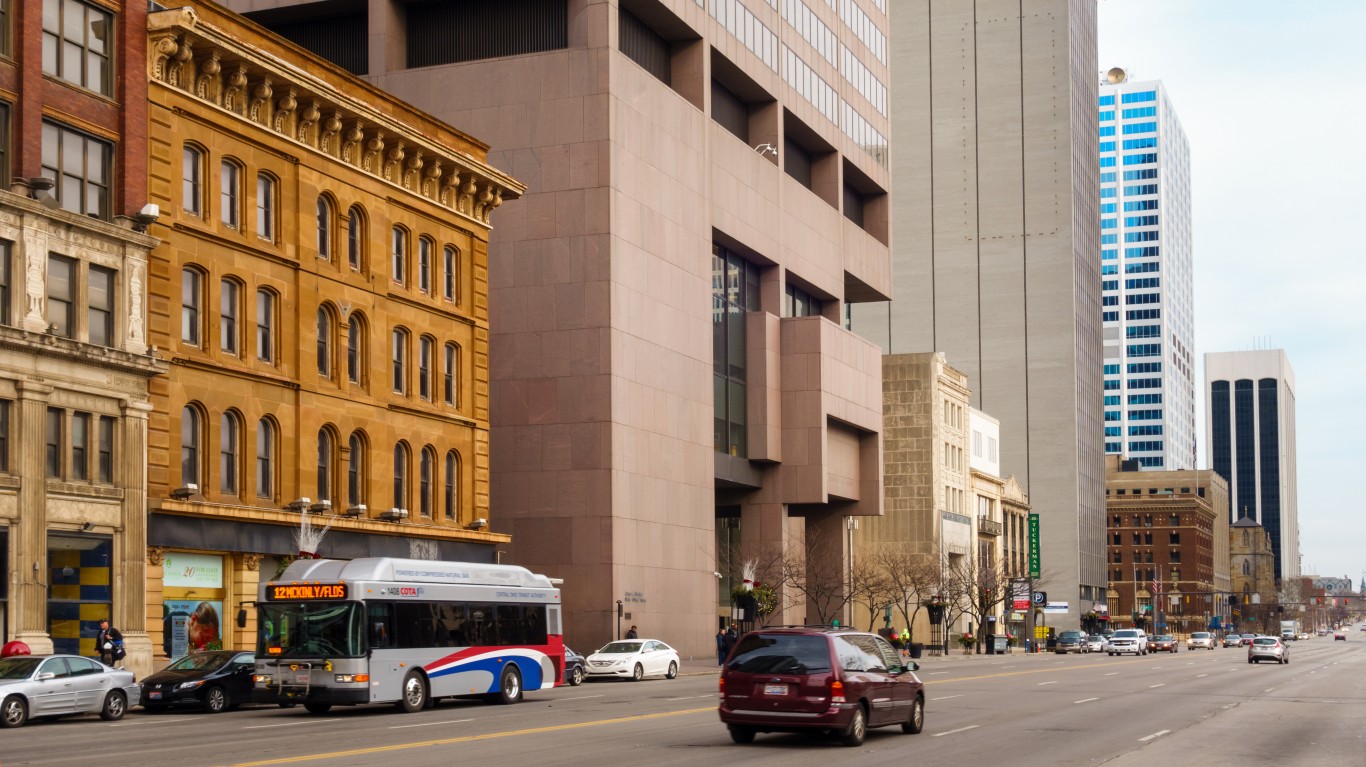
45. Ohio
> Total infrastructure spending: $1,087 per person ($12.8 billion total – 8th highest of 50 states)
> Largest infrastructure spending category: Federal Highway Aid; $9.2 billion (71.7% of in-state infrastructure spending)
> 2nd largest infrastructure spending category: Water Infrastructure; $1.4 billion (10.9% of in-state infrastructure spending)
> 3rd largest infrastructure spending category: Public Transportation; $1.2 billion (9.4% of in-state infrastructure spending)
> Urban-rural population divide: 76.3% urban; 23.7% rural (20th largest urban pop., 20th smallest rural pop. of 50 states)
> Total population: 11,799,448 (7th largest of 50 states)
[in-text-ad]
44. Washington
> Total infrastructure spending: $1,115 per person ($8.6 billion total – 16th highest of 50 states)
> Largest infrastructure spending category: Federal Highway Aid; $4.7 billion (54.7% of in-state infrastructure spending)
> 2nd largest infrastructure spending category: Public Transportation; $1.8 billion (20.8% of in-state infrastructure spending)
> 3rd largest infrastructure spending category: Water Infrastructure; $882.0 million (10.3% of in-state infrastructure spending)
> Urban-rural population divide: 83.4% urban; 16.6% rural (16th largest urban pop., 16th smallest rural pop. of 50 states)
> Total population: 7,705,281 (13th largest of 50 states)
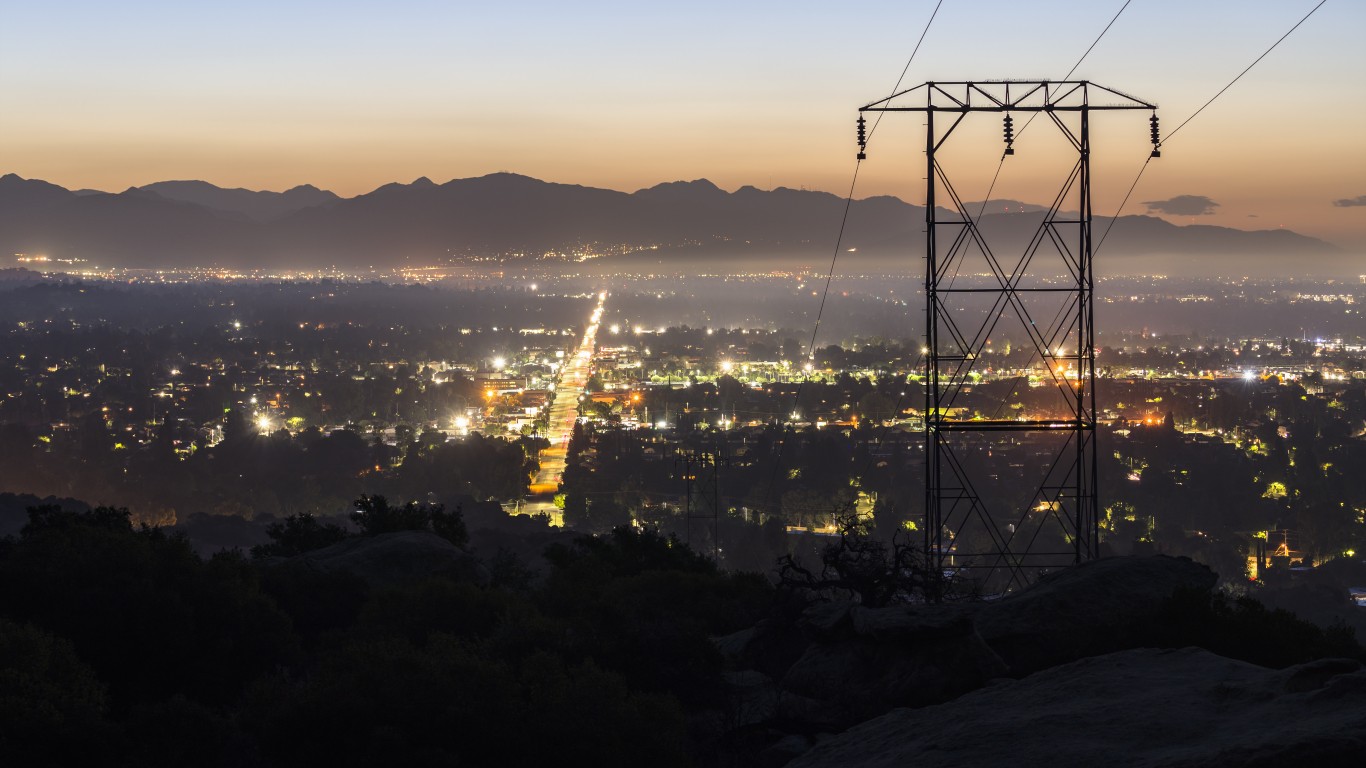
43. California
> Total infrastructure spending: $1,127 per person ($44.6 billion total – the highest of 50 states)
> Largest infrastructure spending category: Federal Highway Aid; $25.3 billion (56.8% of in-state infrastructure spending)
> 2nd largest infrastructure spending category: Public Transportation; $9.5 billion (21.2% of in-state infrastructure spending)
> 3rd largest infrastructure spending category: Bridge Replacements and Repairs; $4.2 billion (9.4% of in-state infrastructure spending)
> Urban-rural population divide: 94.2% urban; 5.8% rural (the largest urban pop., the smallest rural pop. of 50 states)
> Total population: 39,538,223 (the largest of 50 states)
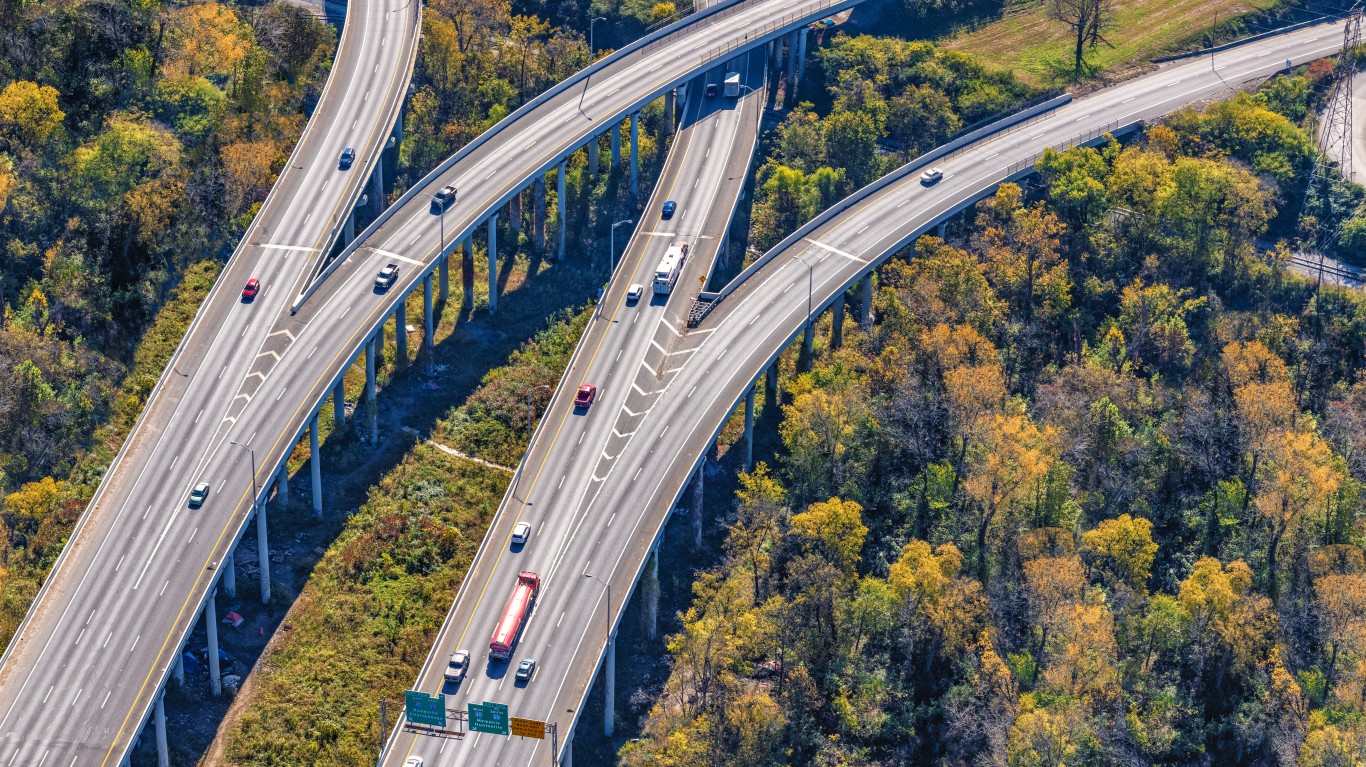
42. Tennessee
> Total infrastructure spending: $1,151 per person ($8.0 billion total – 17th highest of 50 states)
> Largest infrastructure spending category: Federal Highway Aid; $5.8 billion (72.9% of in-state infrastructure spending)
> 2nd largest infrastructure spending category: Water Infrastructure; $697.0 million (8.8% of in-state infrastructure spending)
> 3rd largest infrastructure spending category: Public Transportation; $630.0 million (7.9% of in-state infrastructure spending)
> Urban-rural population divide: 66.2% urban; 33.8% rural (16th smallest urban pop., 16th largest rural pop. of 50 states)
> Total population: 6,910,840 (16th largest of 50 states)
[in-text-ad-2]
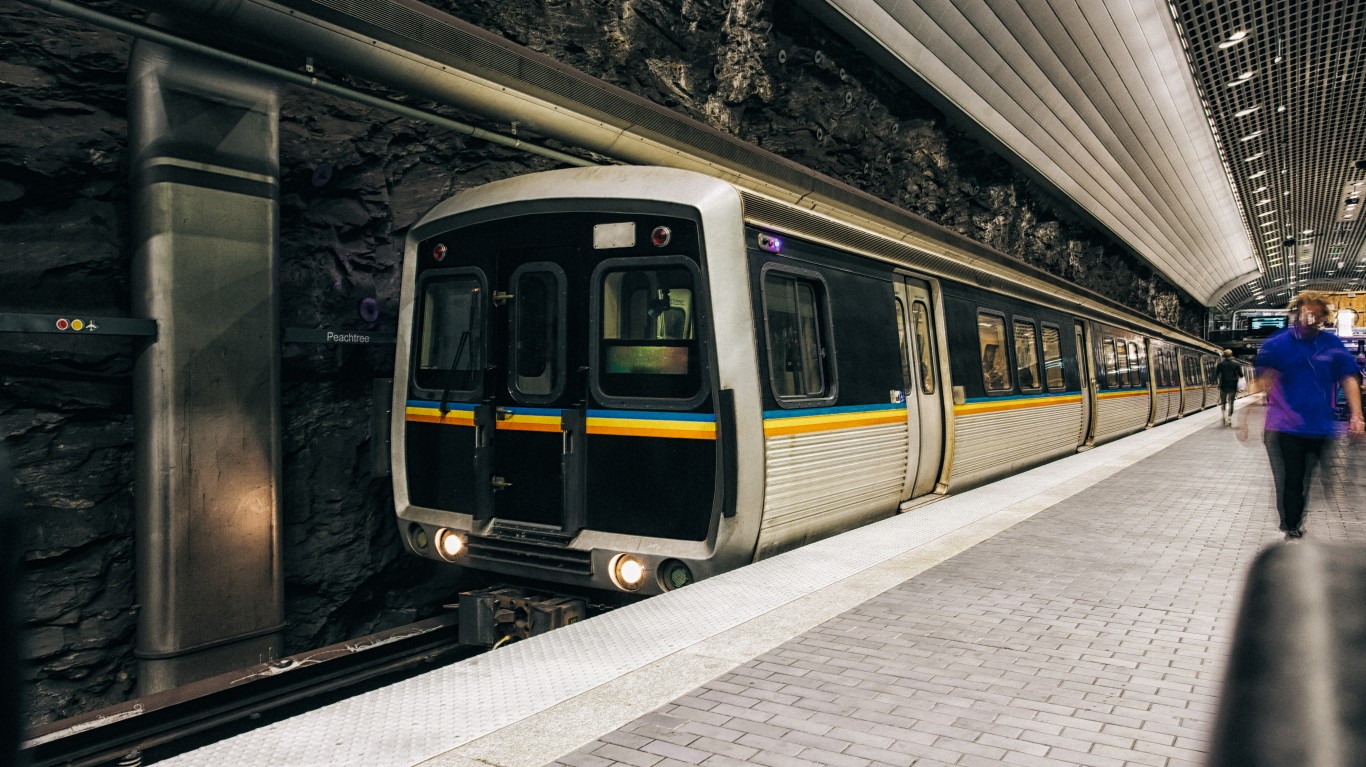
41. Georgia
> Total infrastructure spending: $1,152 per person ($12.3 billion total – 9th highest of 50 states)
> Largest infrastructure spending category: Federal Highway Aid; $8.9 billion (72.1% of in-state infrastructure spending)
> 2nd largest infrastructure spending category: Public Transportation; $1.4 billion (11.3% of in-state infrastructure spending)
> 3rd largest infrastructure spending category: Water Infrastructure; $913.0 million (7.4% of in-state infrastructure spending)
> Urban-rural population divide: 74.1% urban; 25.9% rural (23rd largest urban pop., 23rd smallest rural pop. of 50 states)
> Total population: 10,711,908 (8th largest of 50 states)
40. Virginia
> Total infrastructure spending: $1,170 per person ($10.1 billion total – 12th highest of 50 states)
> Largest infrastructure spending category: Federal Highway Aid; $7.0 billion (69.3% of in-state infrastructure spending)
> 2nd largest infrastructure spending category: Public Transportation; $1.2 billion (11.9% of in-state infrastructure spending)
> 3rd largest infrastructure spending category: Water Infrastructure; $738.0 million (7.3% of in-state infrastructure spending)
> Urban-rural population divide: 75.6% urban; 24.4% rural (21st largest urban pop., 21st smallest rural pop. of 50 states)
> Total population: 8,631,393 (12th largest of 50 states)
[in-text-ad]
39. Minnesota
> Total infrastructure spending: $1,192 per person ($6.8 billion total – 23rd highest of 50 states)
> Largest infrastructure spending category: Federal Highway Aid; $4.5 billion (66.2% of in-state infrastructure spending)
> 2nd largest infrastructure spending category: Public Transportation; $818.0 million (12.0% of in-state infrastructure spending)
> 3rd largest infrastructure spending category: Water Infrastructure; $680.0 million (10.0% of in-state infrastructure spending)
> Urban-rural population divide: 71.9% urban; 28.1% rural (24th smallest urban pop., 24th largest rural pop. of 50 states)
> Total population: 5,706,494 (22nd largest of 50 states)
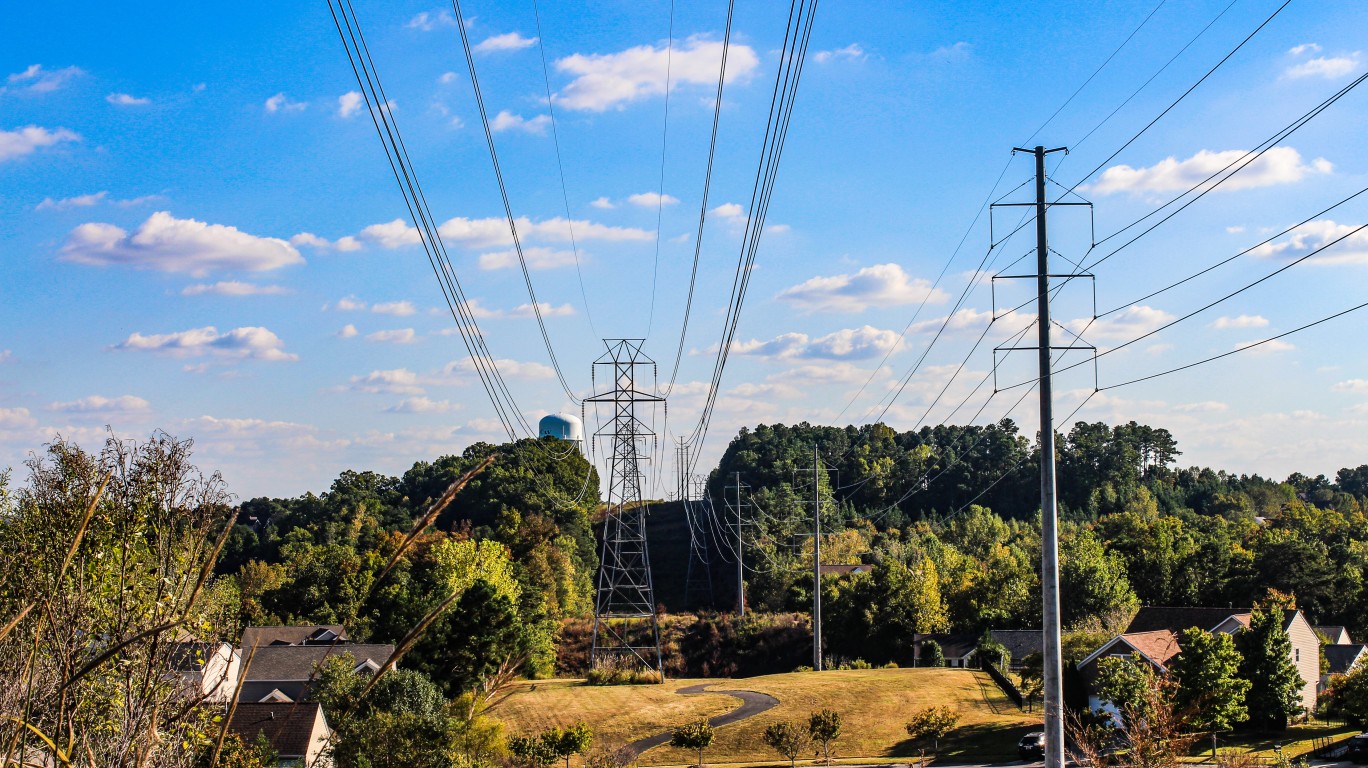
38. South Carolina
> Total infrastructure spending: $1,195 per person ($6.1 billion total – 25th lowest of 50 states)
> Largest infrastructure spending category: Federal Highway Aid; $4.6 billion (75.2% of in-state infrastructure spending)
> 2nd largest infrastructure spending category: Water Infrastructure; $510.0 million (8.3% of in-state infrastructure spending)
> 3rd largest infrastructure spending category: Public Transportation; $366.0 million (6.0% of in-state infrastructure spending)
> Urban-rural population divide: 67.9% urban; 32.1% rural (19th smallest urban pop., 19th largest rural pop. of 50 states)
> Total population: 5,118,425 (23rd largest of 50 states)
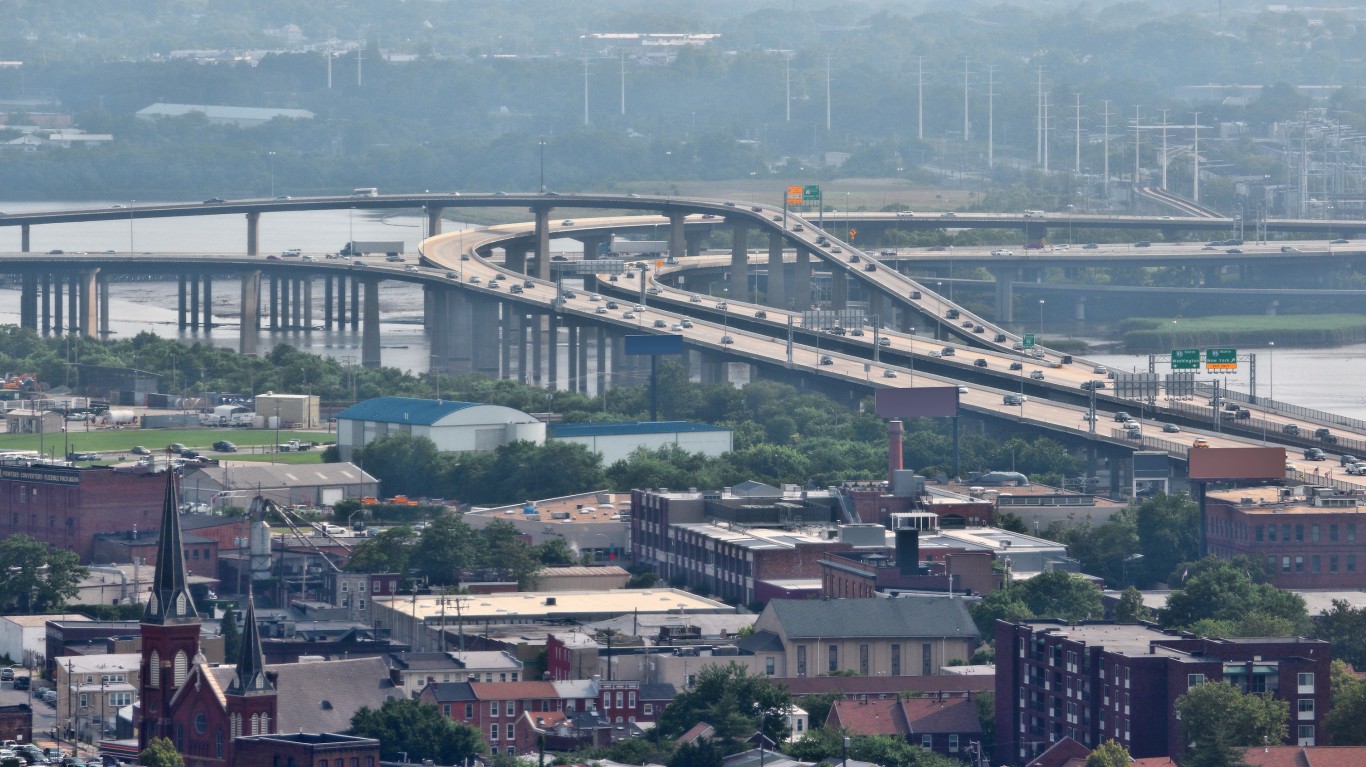
37. Maryland
> Total infrastructure spending: $1,198 per person ($7.4 billion total – 18th highest of 50 states)
> Largest infrastructure spending category: Federal Highway Aid; $4.1 billion (55.4% of in-state infrastructure spending)
> 2nd largest infrastructure spending category: Public Transportation; $1.7 billion (23.0% of in-state infrastructure spending)
> 3rd largest infrastructure spending category: Water Infrastructure; $844.0 million (11.4% of in-state infrastructure spending)
> Urban-rural population divide: 85.6% urban; 14.4% rural (14th largest urban pop., 14th smallest rural pop. of 50 states)
> Total population: 6,177,224 (18th largest of 50 states)
[in-text-ad-2]
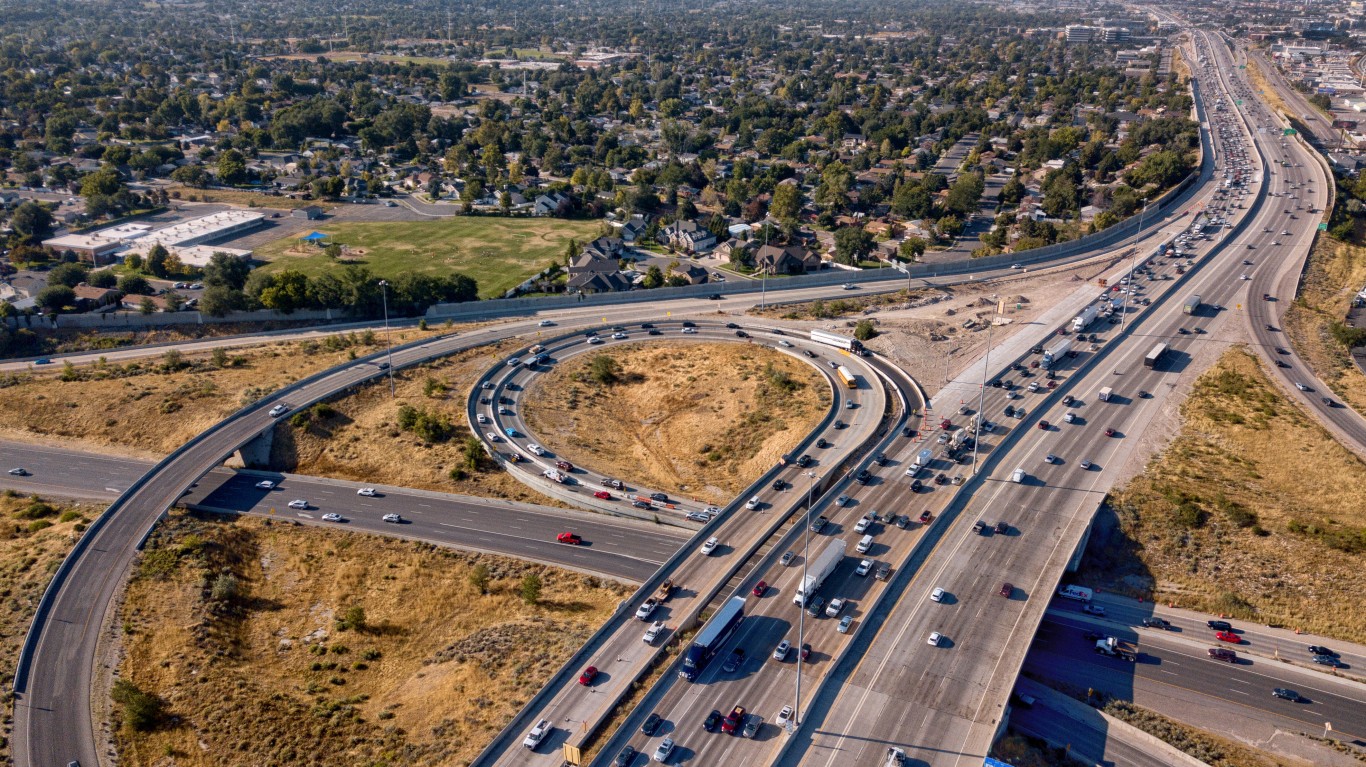
36. Utah
> Total infrastructure spending: $1,209 per person ($4.0 billion total – 15th lowest of 50 states)
> Largest infrastructure spending category: Federal Highway Aid; $2.4 billion (60.7% of in-state infrastructure spending)
> 2nd largest infrastructure spending category: Public Transportation; $623.0 million (15.7% of in-state infrastructure spending)
> 3rd largest infrastructure spending category: Water Infrastructure; $360.0 million (9.1% of in-state infrastructure spending)
> Urban-rural population divide: 89.8% urban; 10.2% rural (7th largest urban pop., 7th smallest rural pop. of 50 states)
> Total population: 3,271,616 (21st smallest of 50 states)
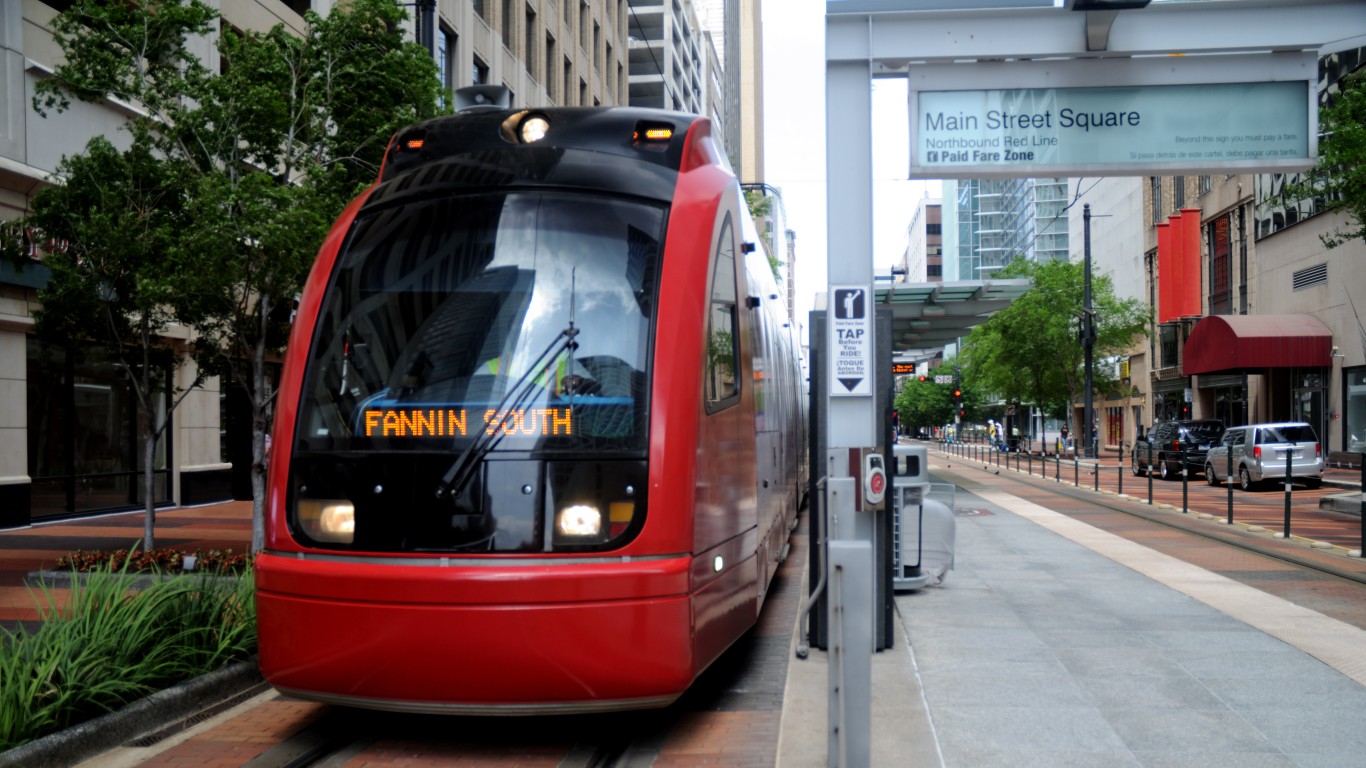
35. Texas
> Total infrastructure spending: $1,216 per person ($35.4 billion total – 2nd highest of 50 states)
> Largest infrastructure spending category: Federal Highway Aid; $26.9 billion (75.9% of in-state infrastructure spending)
> 2nd largest infrastructure spending category: Public Transportation; $3.3 billion (9.3% of in-state infrastructure spending)
> 3rd largest infrastructure spending category: Water Infrastructure; $2.9 billion (8.2% of in-state infrastructure spending)
> Urban-rural population divide: 83.7% urban; 16.3% rural (15th largest urban pop., 15th smallest rural pop. of 50 states)
> Total population: 29,145,505 (2nd largest of 50 states)
[in-text-ad]
34. Wisconsin
> Total infrastructure spending: $1,234 per person ($7.3 billion total – 20th highest of 50 states)
> Largest infrastructure spending category: Federal Highway Aid; $5.2 billion (71.5% of in-state infrastructure spending)
> 2nd largest infrastructure spending category: Water Infrastructure; $841.0 million (11.6% of in-state infrastructure spending)
> 3rd largest infrastructure spending category: Public Transportation; $592.0 million (8.1% of in-state infrastructure spending)
> Urban-rural population divide: 67.1% urban; 32.9% rural (18th smallest urban pop., 18th largest rural pop. of 50 states)
> Total population: 5,893,718 (20th largest of 50 states)
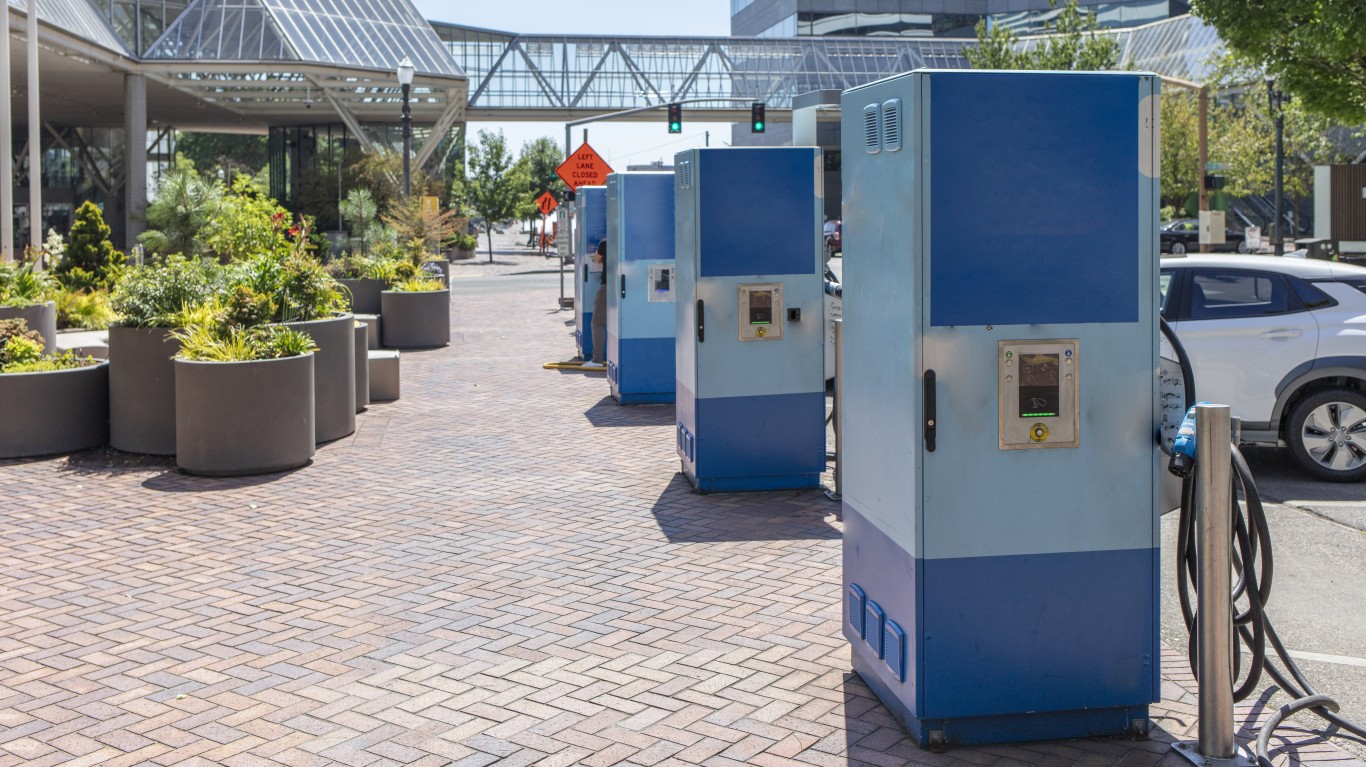
33. Oregon
> Total infrastructure spending: $1,265 per person ($5.4 billion total – 22nd lowest of 50 states)
> Largest infrastructure spending category: Federal Highway Aid; $3.4 billion (63.4% of in-state infrastructure spending)
> 2nd largest infrastructure spending category: Public Transportation; $747.0 million (13.9% of in-state infrastructure spending)
> 3rd largest infrastructure spending category: Water Infrastructure; $529.0 million (9.9% of in-state infrastructure spending)
> Urban-rural population divide: 80.5% urban; 19.5% rural (18th largest urban pop., 18th smallest rural pop. of 50 states)
> Total population: 4,237,256 (24th smallest of 50 states)
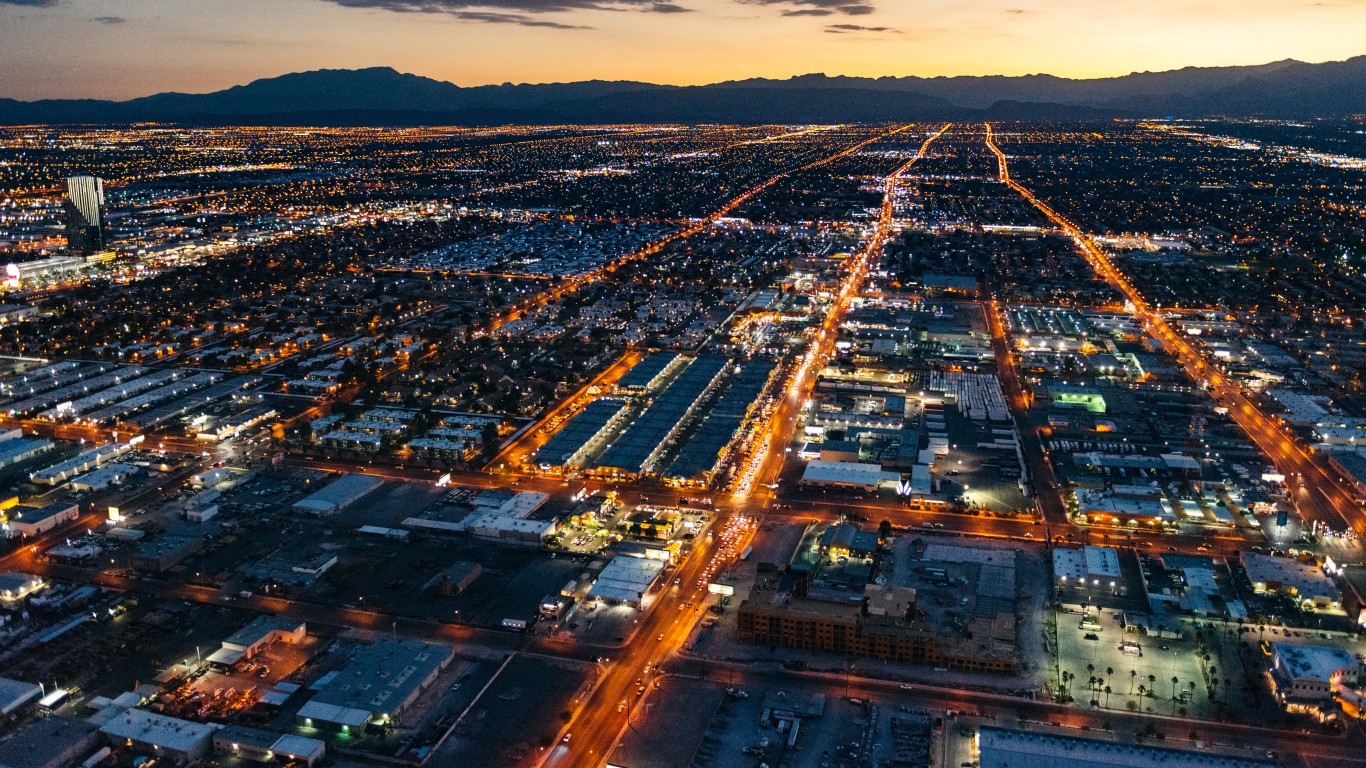
32. Nevada
> Total infrastructure spending: $1,301 per person ($4.0 billion total – 16th lowest of 50 states)
> Largest infrastructure spending category: Federal Highway Aid; $2.5 billion (61.9% of in-state infrastructure spending)
> 2nd largest infrastructure spending category: Public Transportation; $459.0 million (11.4% of in-state infrastructure spending)
> 3rd largest infrastructure spending category: Water Infrastructure; $403.0 million (10.0% of in-state infrastructure spending)
> Urban-rural population divide: 94.1% urban; 5.9% rural (2nd largest urban pop., 2nd smallest rural pop. of 50 states)
> Total population: 3,104,614 (19th smallest of 50 states)
[in-text-ad-2]
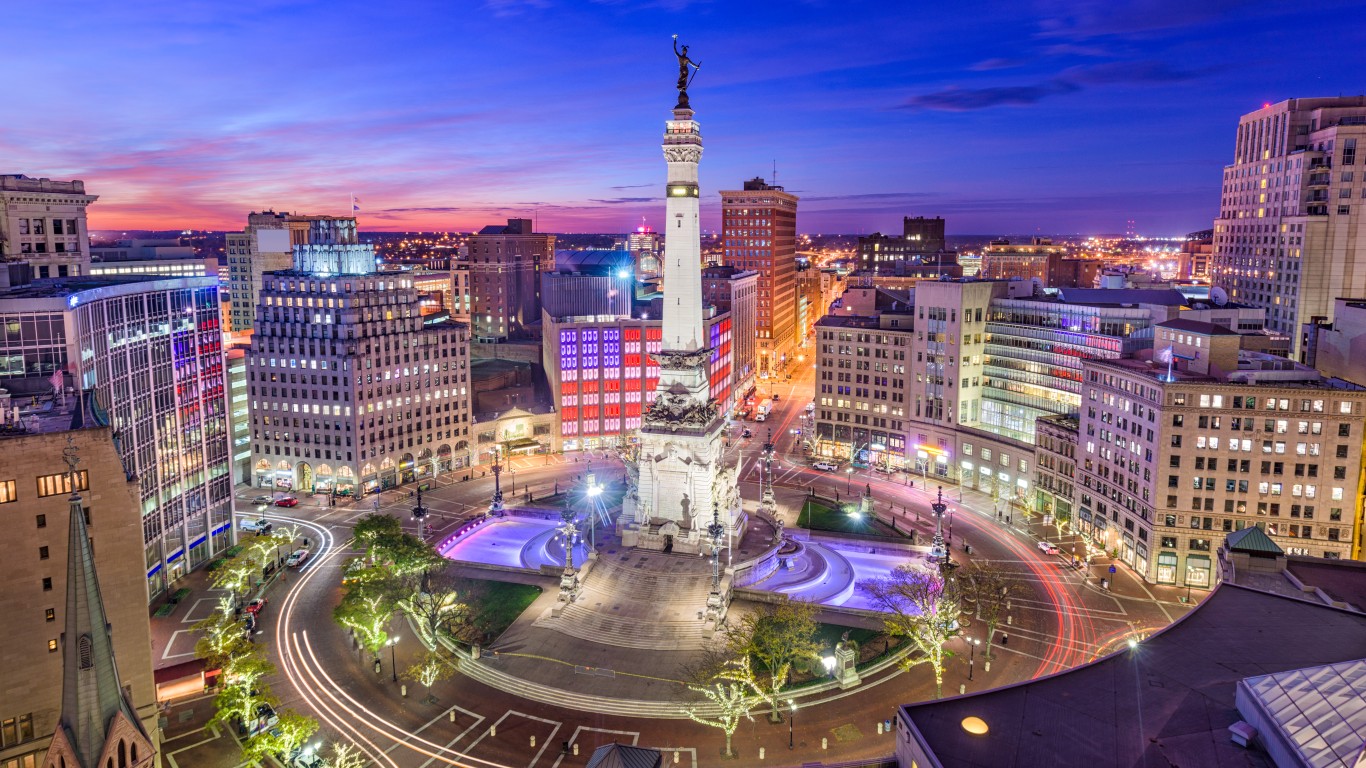
31. Indiana
> Total infrastructure spending: $1,303 per person ($8.8 billion total – 15th highest of 50 states)
> Largest infrastructure spending category: Federal Highway Aid; $6.6 billion (74.6% of in-state infrastructure spending)
> 2nd largest infrastructure spending category: Water Infrastructure; $751.0 million (8.5% of in-state infrastructure spending)
> 3rd largest infrastructure spending category: Public Transportation; $680.0 million (7.7% of in-state infrastructure spending)
> Urban-rural population divide: 71.2% urban; 28.8% rural (22nd smallest urban pop., 22nd largest rural pop. of 50 states)
> Total population: 6,785,528 (17th largest of 50 states)
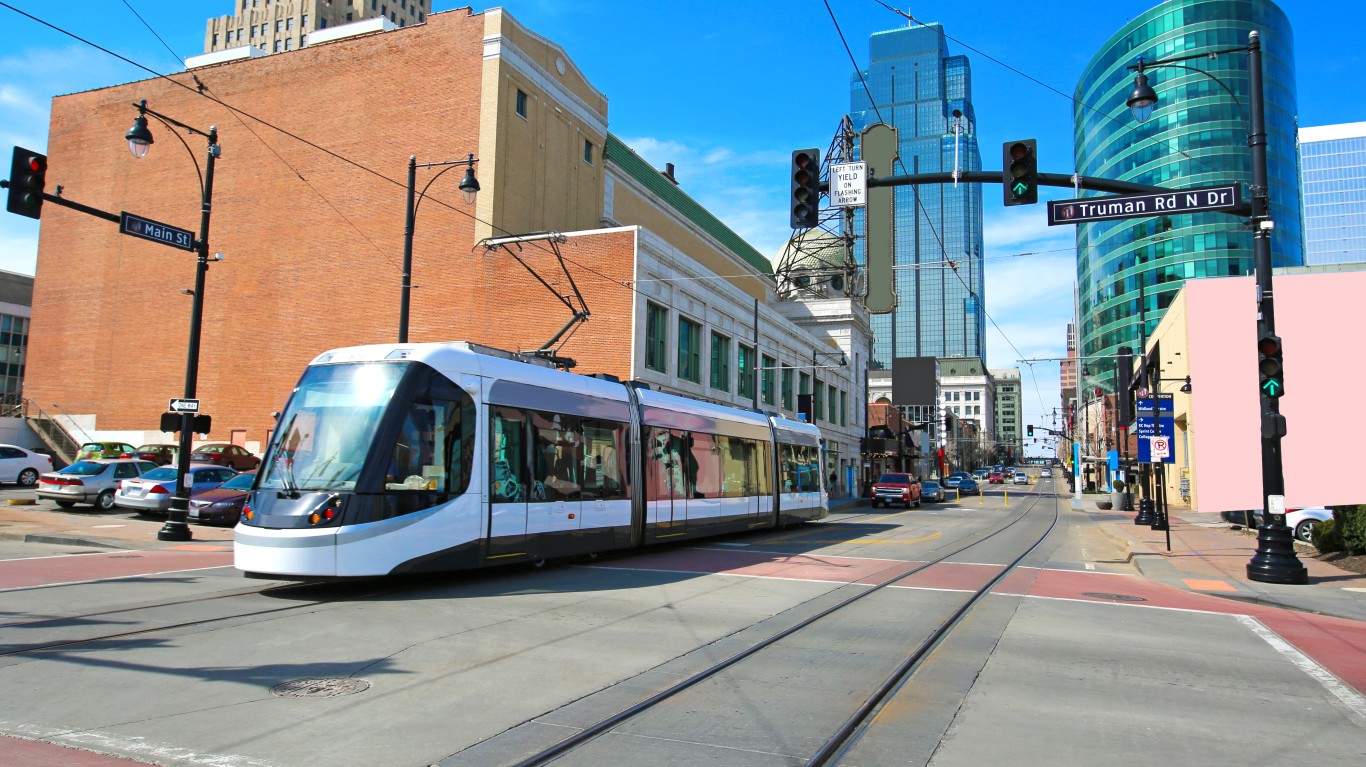
30. Kansas
> Total infrastructure spending: $1,307 per person ($3.8 billion total – 13th lowest of 50 states)
> Largest infrastructure spending category: Federal Highway Aid; $2.6 billion (67.7% of in-state infrastructure spending)
> 2nd largest infrastructure spending category: Water Infrastructure; $454.0 million (11.8% of in-state infrastructure spending)
> 3rd largest infrastructure spending category: Public Transportation; $272.0 million (7.1% of in-state infrastructure spending)
> Urban-rural population divide: 72.3% urban; 27.7% rural (25th smallest urban pop., 25th largest rural pop. of 50 states)
> Total population: 2,937,880 (16th smallest of 50 states)
[in-text-ad]

29. Massachusetts
> Total infrastructure spending: $1,327 per person ($9.3 billion total – 13th highest of 50 states)
> Largest infrastructure spending category: Federal Highway Aid; $4.2 billion (45.0% of in-state infrastructure spending)
> 2nd largest infrastructure spending category: Public Transportation; $2.5 billion (26.8% of in-state infrastructure spending)
> 3rd largest infrastructure spending category: Bridge Replacements and Repairs; $1.1 billion (11.8% of in-state infrastructure spending)
> Urban-rural population divide: 91.3% urban; 8.7% rural (5th largest urban pop., 5th smallest rural pop. of 50 states)
> Total population: 7,029,917 (15th largest of 50 states)
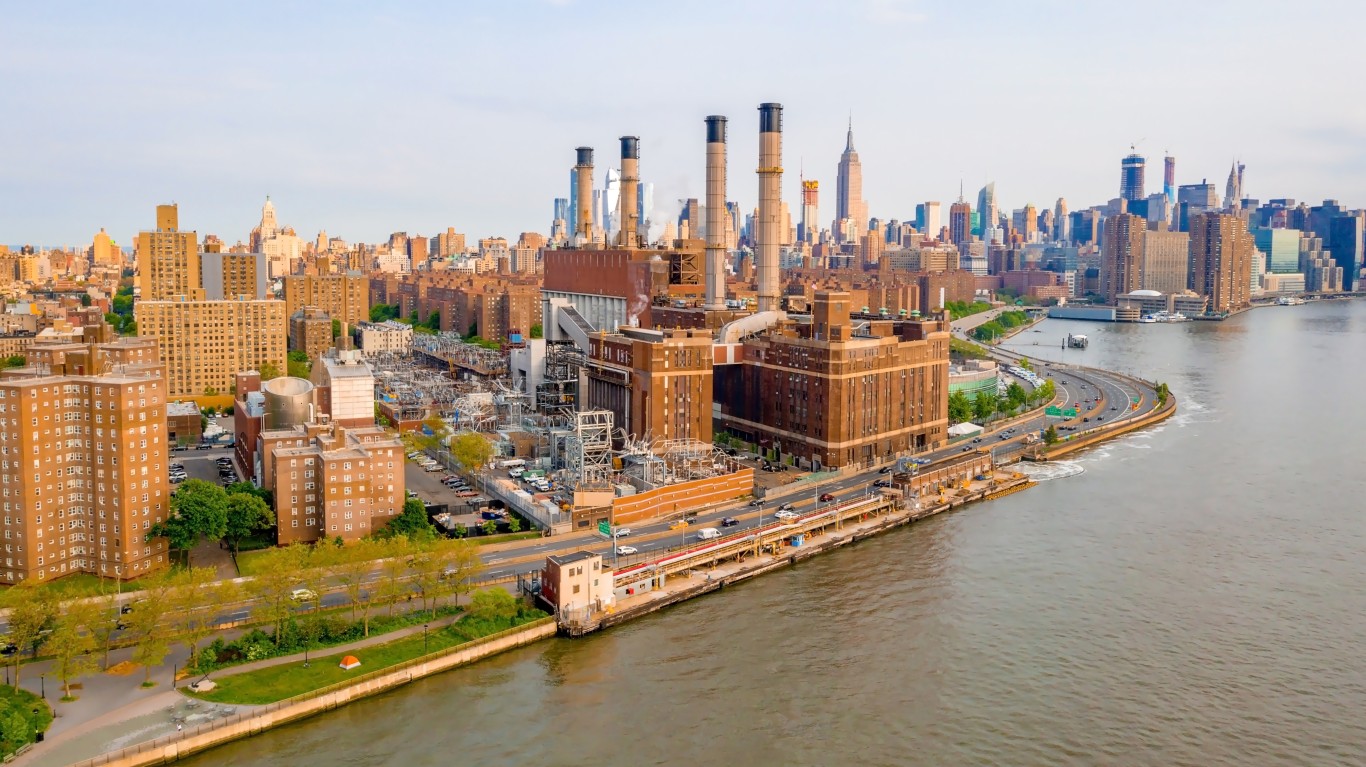
28. New York
> Total infrastructure spending: $1,333 per person ($26.9 billion total – 3rd highest of 50 states)
> Largest infrastructure spending category: Federal Highway Aid; $11.6 billion (43.1% of in-state infrastructure spending)
> 2nd largest infrastructure spending category: Public Transportation; $9.8 billion (36.4% of in-state infrastructure spending)
> 3rd largest infrastructure spending category: Water Infrastructure; $2.6 billion (9.7% of in-state infrastructure spending)
> Urban-rural population divide: 87.4% urban; 12.6% rural (9th largest urban pop., 9th smallest rural pop. of 50 states)
> Total population: 20,201,249 (4th largest of 50 states)
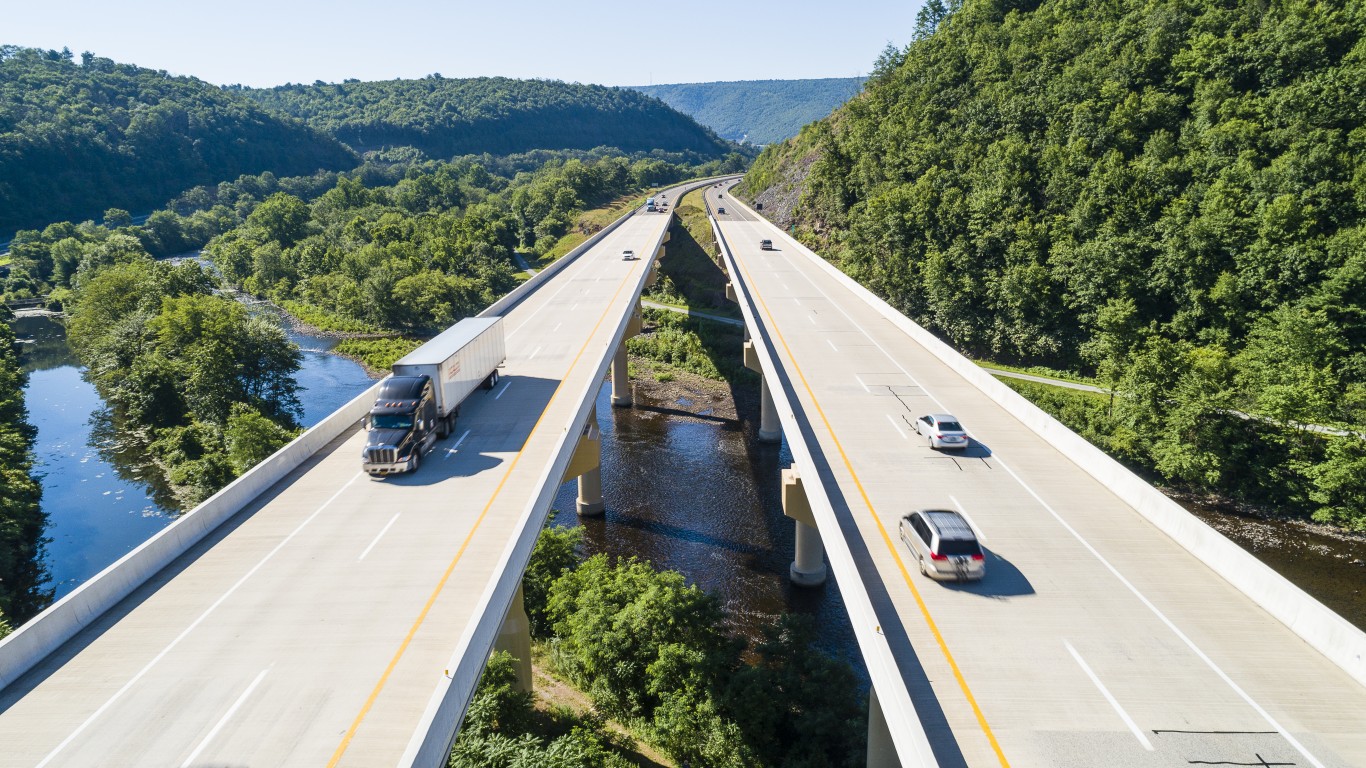
27. Pennsylvania
> Total infrastructure spending: $1,369 per person ($17.8 billion total – 6th highest of 50 states)
> Largest infrastructure spending category: Federal Highway Aid; $11.3 billion (63.5% of in-state infrastructure spending)
> 2nd largest infrastructure spending category: Public Transportation; $2.8 billion (15.7% of in-state infrastructure spending)
> 3rd largest infrastructure spending category: Bridge Replacements and Repairs; $1.6 billion (9.0% of in-state infrastructure spending)
> Urban-rural population divide: 76.5% urban; 23.5% rural (19th largest urban pop., 19th smallest rural pop. of 50 states)
> Total population: 13,002,700 (5th largest of 50 states)
[in-text-ad-2]
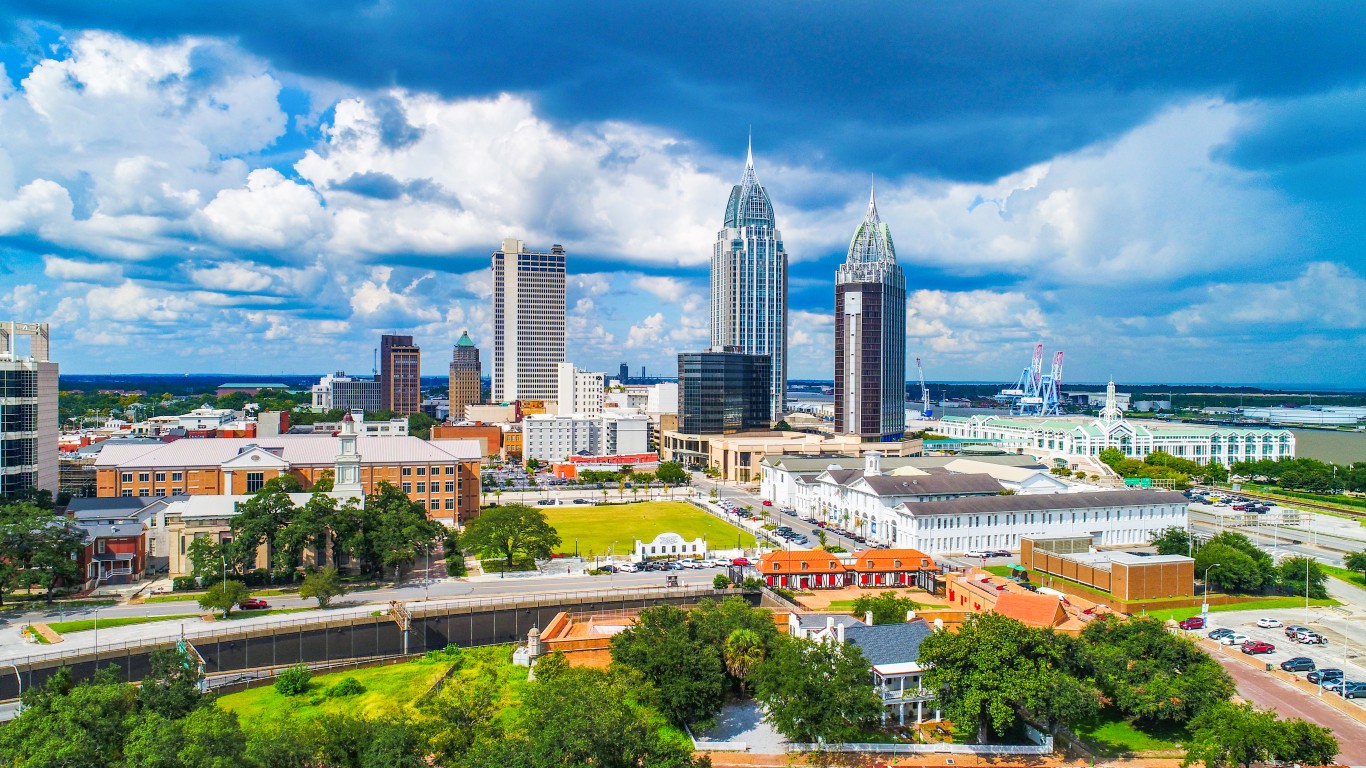
26. Alabama
> Total infrastructure spending: $1,387 per person ($7.0 billion total – 22nd highest of 50 states)
> Largest infrastructure spending category: Federal Highway Aid; $5.2 billion (74.6% of in-state infrastructure spending)
> 2nd largest infrastructure spending category: Water Infrastructure; $782.0 million (11.2% of in-state infrastructure spending)
> 3rd largest infrastructure spending category: Public Transportation; $400.0 million (5.7% of in-state infrastructure spending)
> Urban-rural population divide: 57.7% urban; 42.3% rural (8th smallest urban pop., 8th largest rural pop. of 50 states)
> Total population: 5,024,279 (24th largest of 50 states)
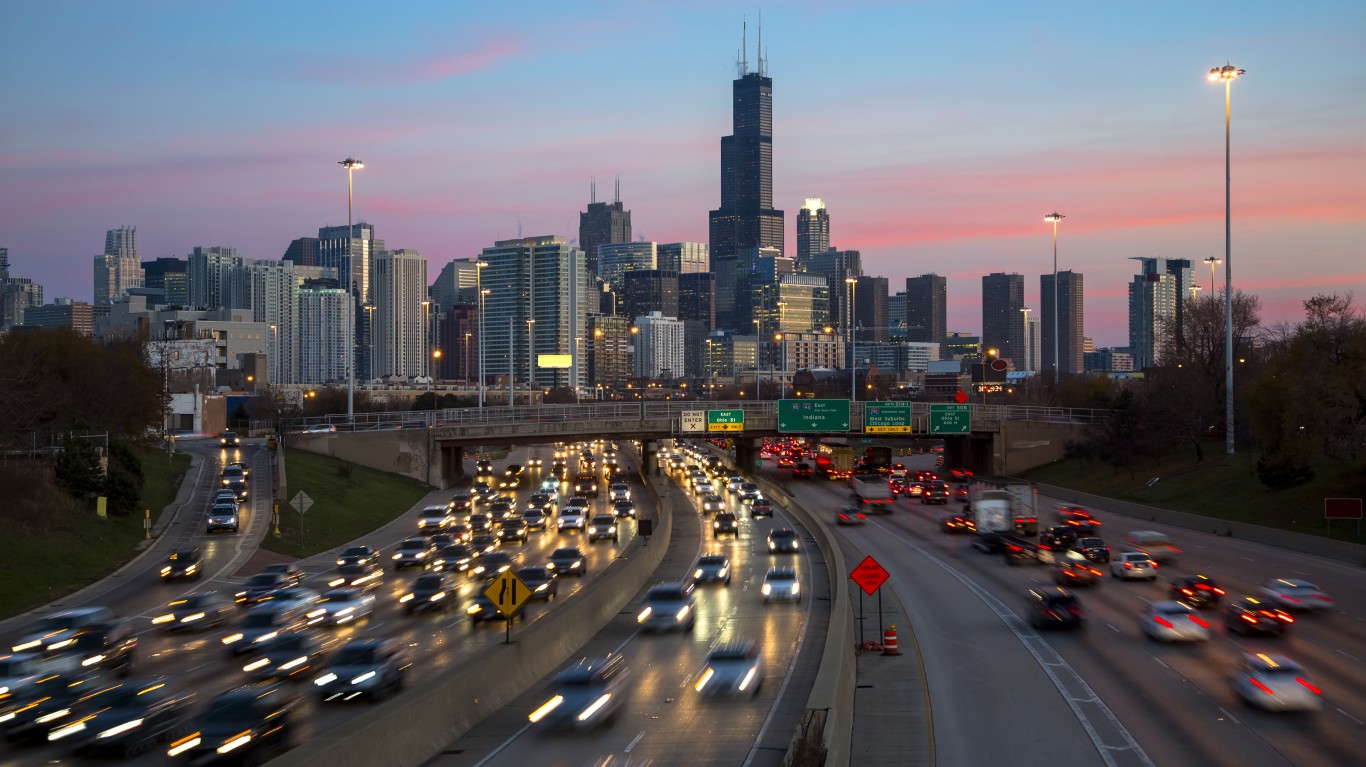
25. Illinois
> Total infrastructure spending: $1,390 per person ($17.8 billion total – 5th highest of 50 states)
> Largest infrastructure spending category: Federal Highway Aid; $9.8 billion (55.0% of in-state infrastructure spending)
> 2nd largest infrastructure spending category: Public Transportation; $4.0 billion (22.5% of in-state infrastructure spending)
> 3rd largest infrastructure spending category: Water Infrastructure; $1.7 billion (9.5% of in-state infrastructure spending)
> Urban-rural population divide: 86.9% urban; 13.1% rural (10th largest urban pop., 10th smallest rural pop. of 50 states)
> Total population: 12,812,508 (6th largest of 50 states)
[in-text-ad]
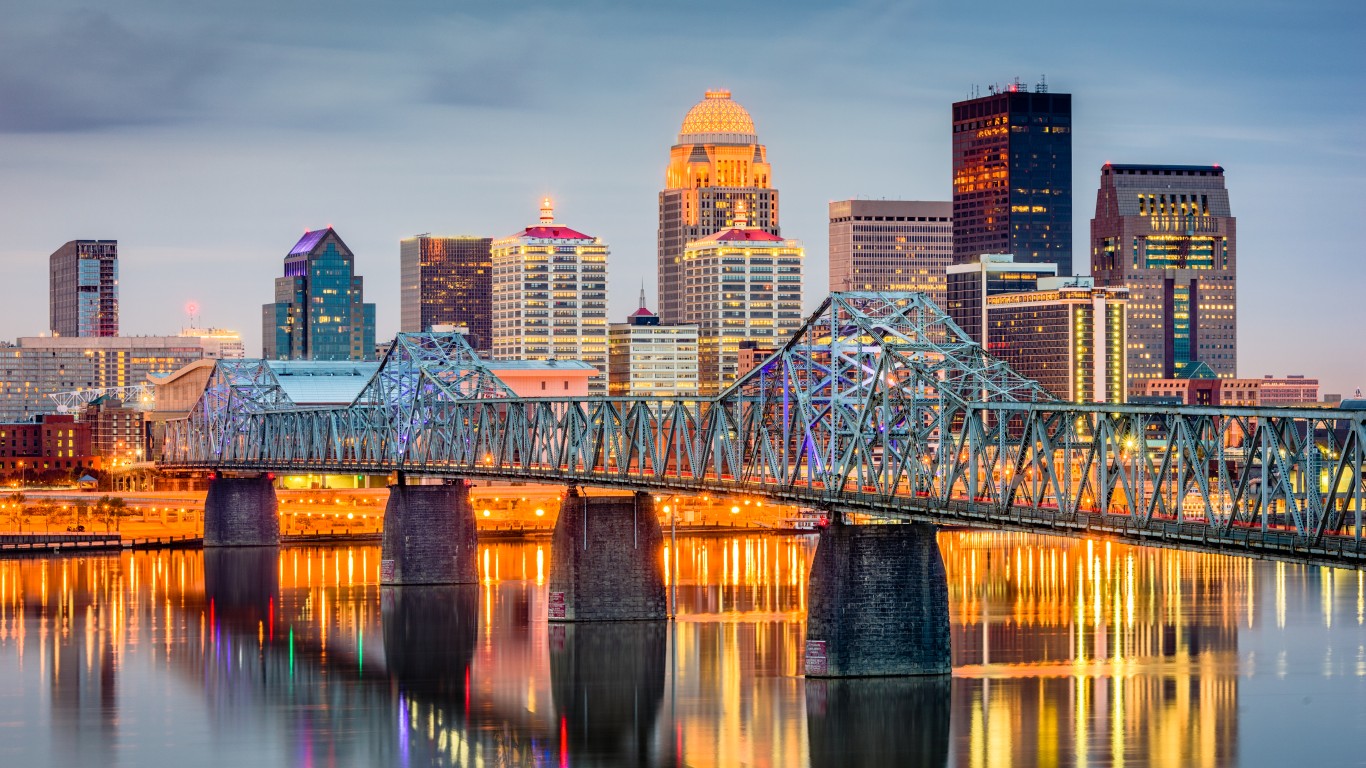
24. Kentucky
> Total infrastructure spending: $1,439 per person ($6.5 billion total – 24th highest of 50 states)
> Largest infrastructure spending category: Federal Highway Aid; $4.6 billion (70.9% of in-state infrastructure spending)
> 2nd largest infrastructure spending category: Water Infrastructure; $647.0 million (10.0% of in-state infrastructure spending)
> 3rd largest infrastructure spending category: Bridge Replacements and Repairs; $438.0 million (6.8% of in-state infrastructure spending)
> Urban-rural population divide: 58.7% urban; 41.3% rural (10th smallest urban pop., 10th largest rural pop. of 50 states)
> Total population: 4,505,836 (25th smallest of 50 states)
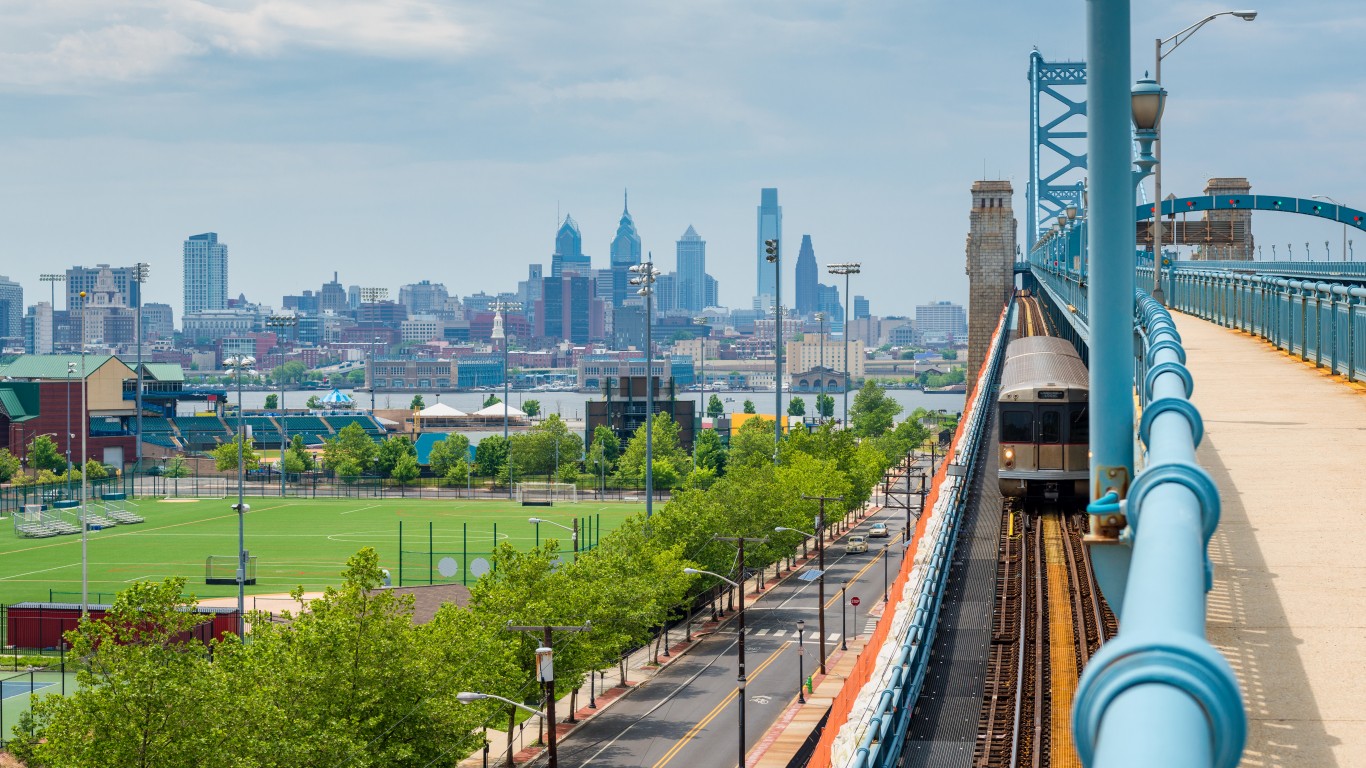
23. New Jersey
> Total infrastructure spending: $1,454 per person ($13.5 billion total – 7th highest of 50 states)
> Largest infrastructure spending category: Federal Highway Aid; $6.8 billion (50.3% of in-state infrastructure spending)
> 2nd largest infrastructure spending category: Public Transportation; $4.1 billion (30.4% of in-state infrastructure spending)
> 3rd largest infrastructure spending category: Bridge Replacements and Repairs; $1.1 billion (8.1% of in-state infrastructure spending)
> Urban-rural population divide: 93.8% urban; 6.2% rural (3rd largest urban pop., 3rd smallest rural pop. of 50 states)
> Total population: 9,288,994 (11th largest of 50 states)
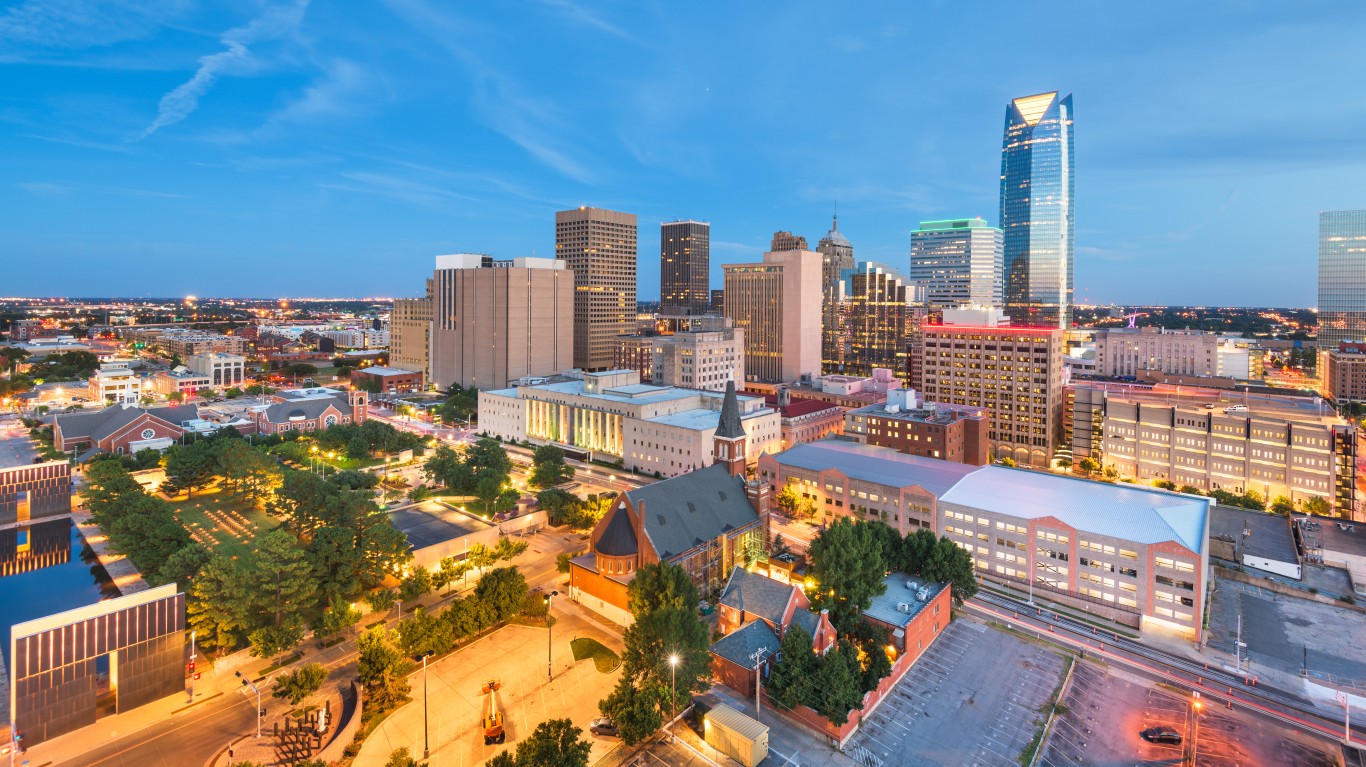
22. Oklahoma
> Total infrastructure spending: $1,458 per person ($5.8 billion total – 23rd lowest of 50 states)
> Largest infrastructure spending category: Federal Highway Aid; $4.3 billion (74.5% of in-state infrastructure spending)
> 2nd largest infrastructure spending category: Water Infrastructure; $520.0 million (9.0% of in-state infrastructure spending)
> 3rd largest infrastructure spending category: Public Transportation; $349.0 million (6.0% of in-state infrastructure spending)
> Urban-rural population divide: 64.6% urban; 35.4% rural (14th smallest urban pop., 14th largest rural pop. of 50 states)
> Total population: 3,959,353 (23rd smallest of 50 states)
[in-text-ad-2]
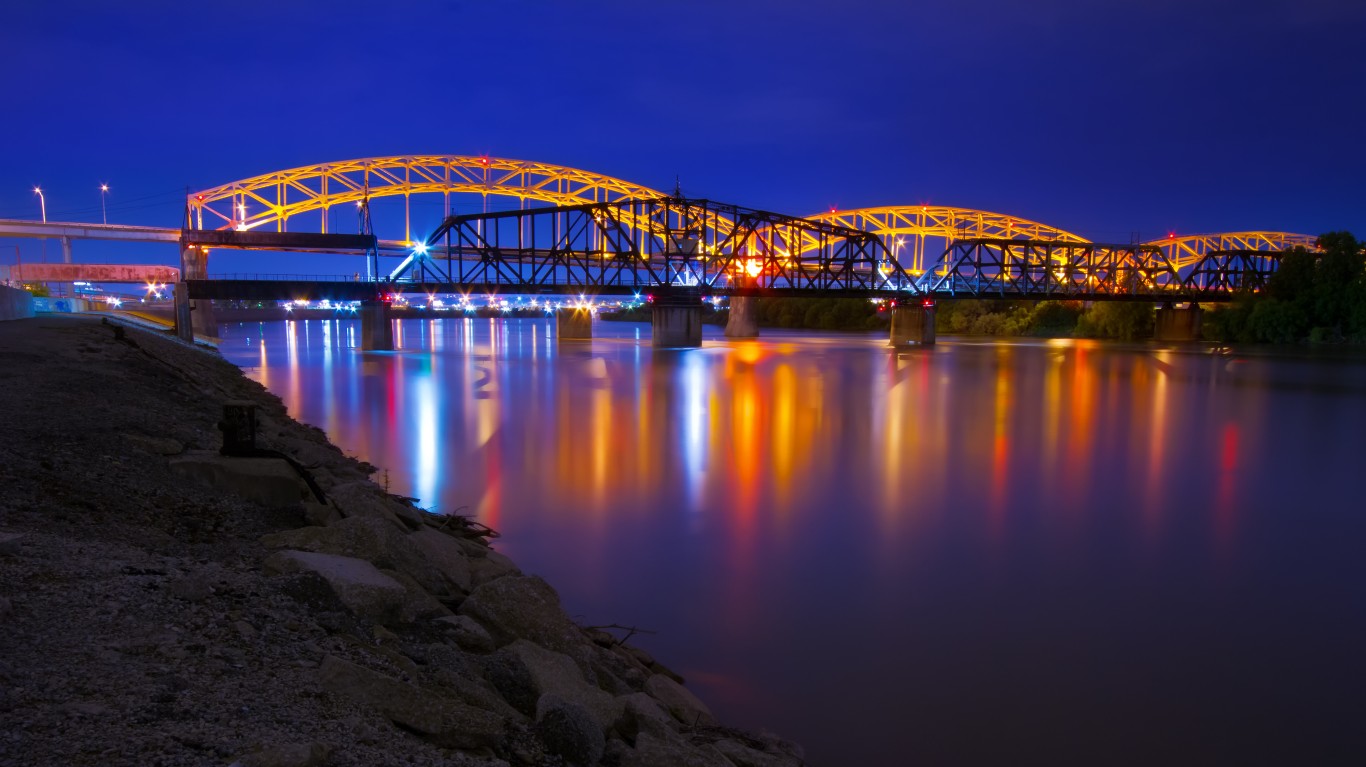
21. Missouri
> Total infrastructure spending: $1,464 per person ($9.0 billion total – 14th highest of 50 states)
> Largest infrastructure spending category: Federal Highway Aid; $6.5 billion (72.2% of in-state infrastructure spending)
> 2nd largest infrastructure spending category: Water Infrastructure; $866.0 million (9.6% of in-state infrastructure spending)
> 3rd largest infrastructure spending category: Public Transportation; $674.0 million (7.5% of in-state infrastructure spending)
> Urban-rural population divide: 69.5% urban; 30.5% rural (21st smallest urban pop., 21st largest rural pop. of 50 states)
> Total population: 6,154,913 (19th largest of 50 states)
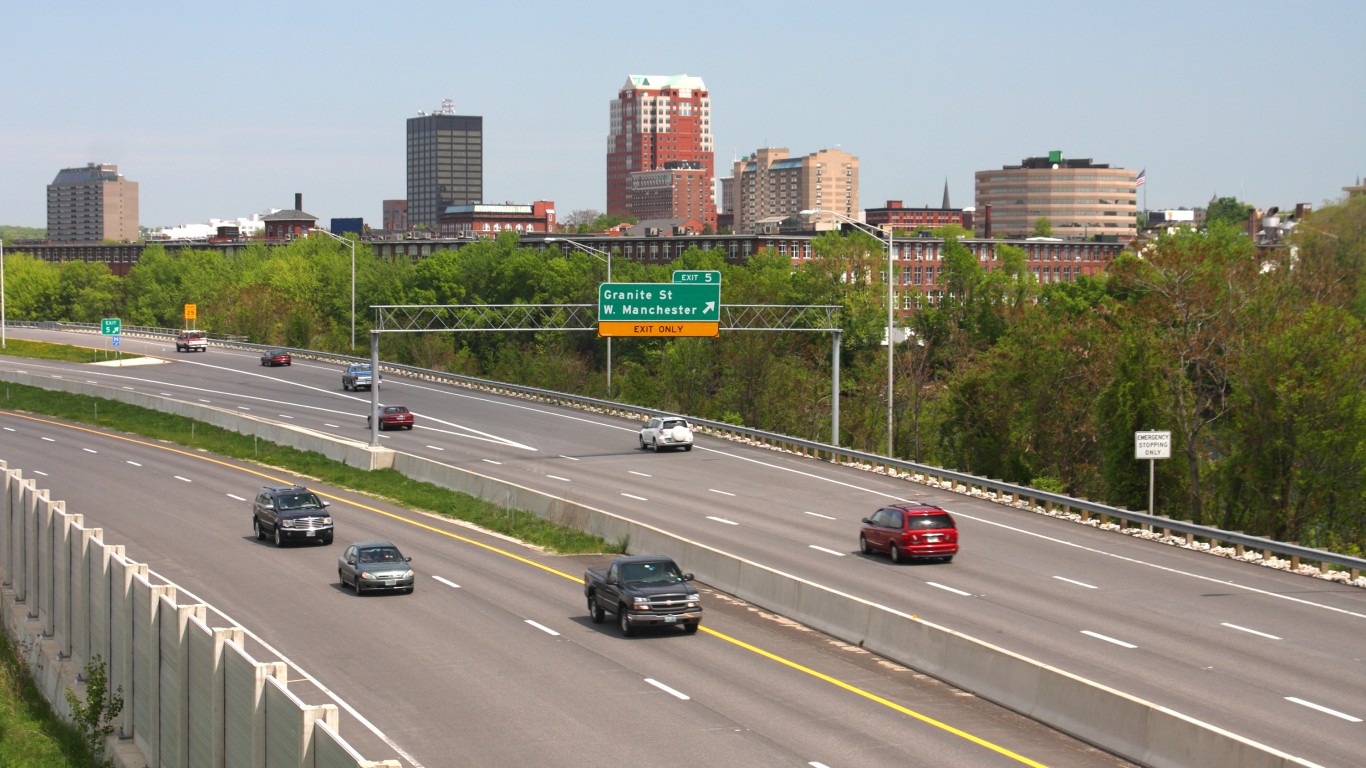
20. New Hampshire
> Total infrastructure spending: $1,487 per person ($2.0 billion total – the lowest of 50 states)
> Largest infrastructure spending category: Federal Highway Aid; $1.1 billion (53.7% of in-state infrastructure spending)
> 2nd largest infrastructure spending category: Water Infrastructure; $418.0 million (20.4% of in-state infrastructure spending)
> 3rd largest infrastructure spending category: Bridge Replacements and Repairs; $225.0 million (11.0% of in-state infrastructure spending)
> Urban-rural population divide: 58.3% urban; 41.7% rural (9th smallest urban pop., 9th largest rural pop. of 50 states)
> Total population: 1,377,529 (10th smallest of 50 states)
[in-text-ad]
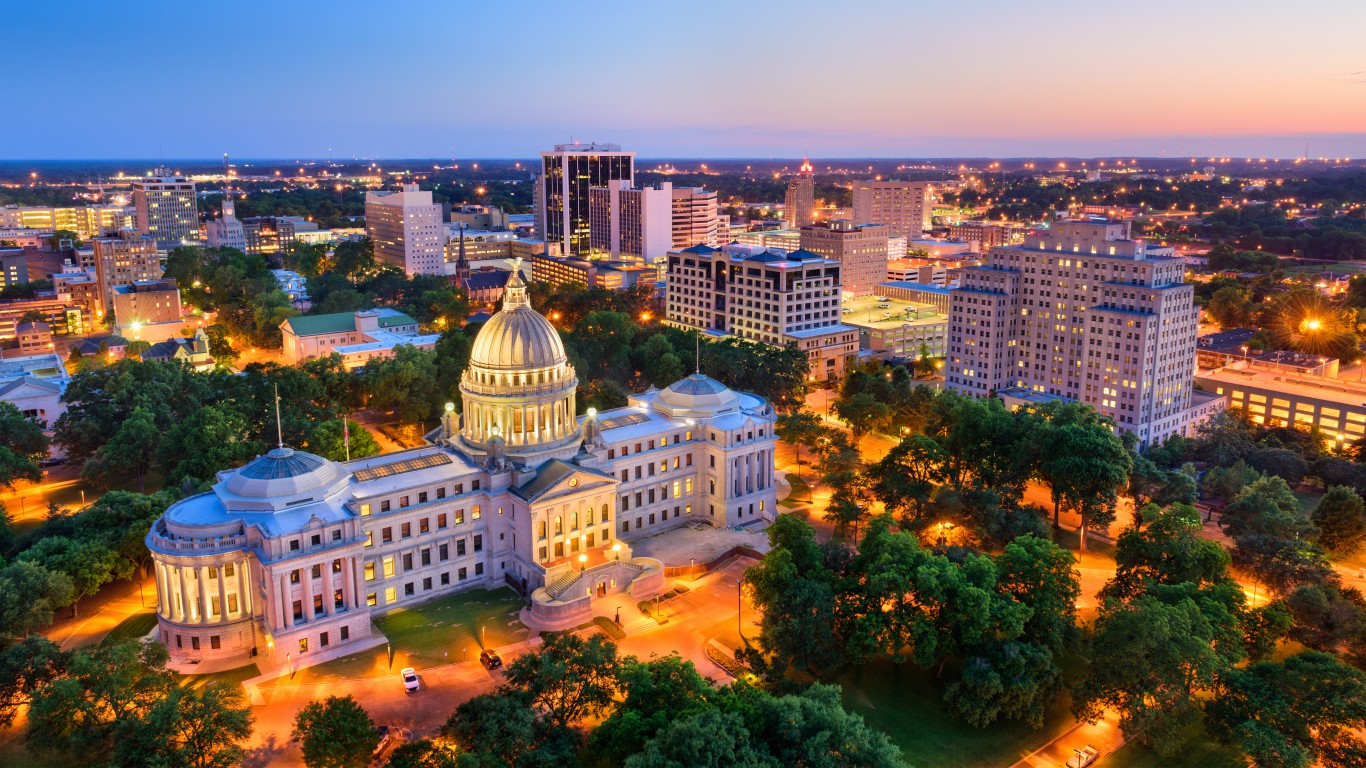
19. Mississippi
> Total infrastructure spending: $1,507 per person ($4.5 billion total – 18th lowest of 50 states)
> Largest infrastructure spending category: Federal Highway Aid; $3.3 billion (74.0% of in-state infrastructure spending)
> 2nd largest infrastructure spending category: Water Infrastructure; $429.0 million (9.6% of in-state infrastructure spending)
> 3rd largest infrastructure spending category: Bridge Replacements and Repairs; $225.0 million (5.0% of in-state infrastructure spending)
> Urban-rural population divide: 46.3% urban; 53.7% rural (4th smallest urban pop., 4th largest rural pop. of 50 states)
> Total population: 2,961,279 (17th smallest of 50 states)
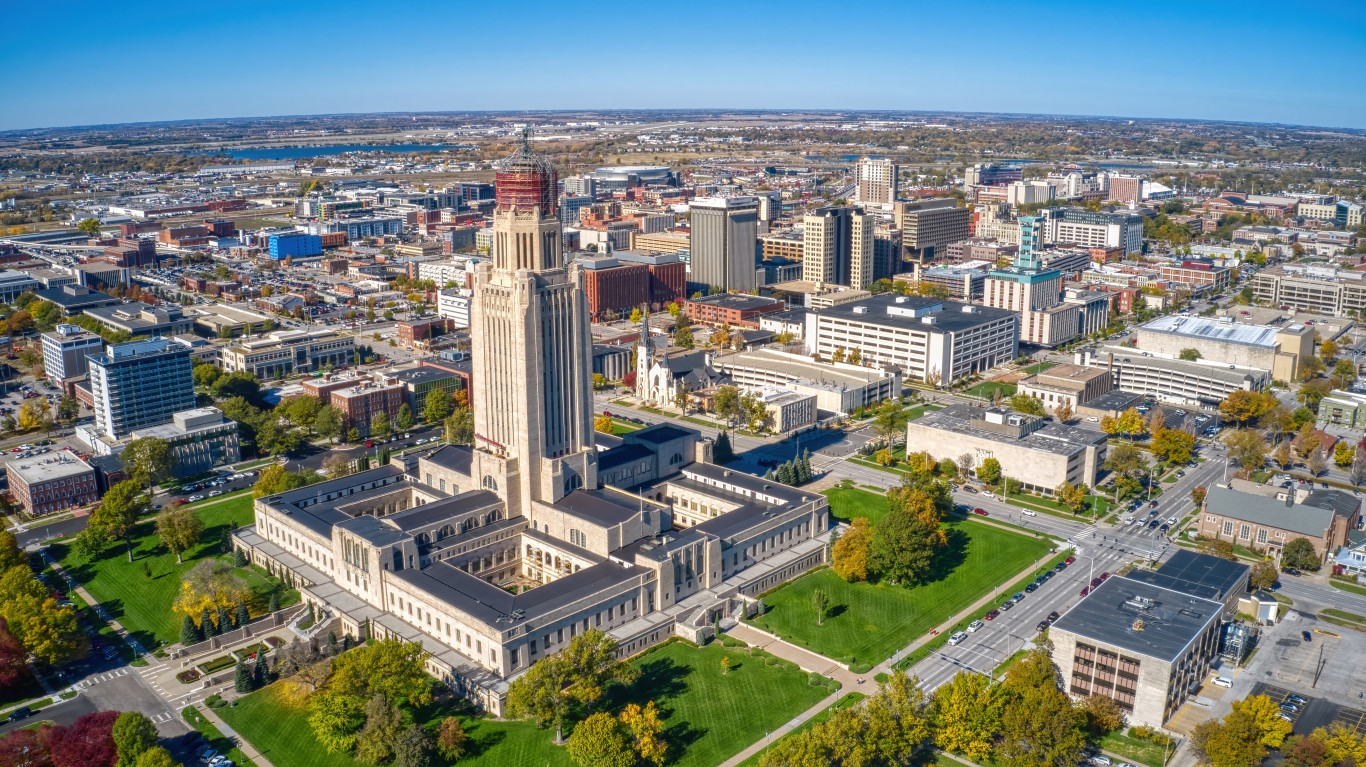
18. Nebraska
> Total infrastructure spending: $1,550 per person ($3.0 billion total – 11th lowest of 50 states)
> Largest infrastructure spending category: Federal Highway Aid; $2.0 billion (65.8% of in-state infrastructure spending)
> 2nd largest infrastructure spending category: Water Infrastructure; $358.0 million (11.8% of in-state infrastructure spending)
> 3rd largest infrastructure spending category: Bridge Replacements and Repairs; $225.0 million (7.4% of in-state infrastructure spending)
> Urban-rural population divide: 73.0% urban; 27.0% rural (25th largest urban pop., 25th smallest rural pop. of 50 states)
> Total population: 1,961,504 (14th smallest of 50 states)
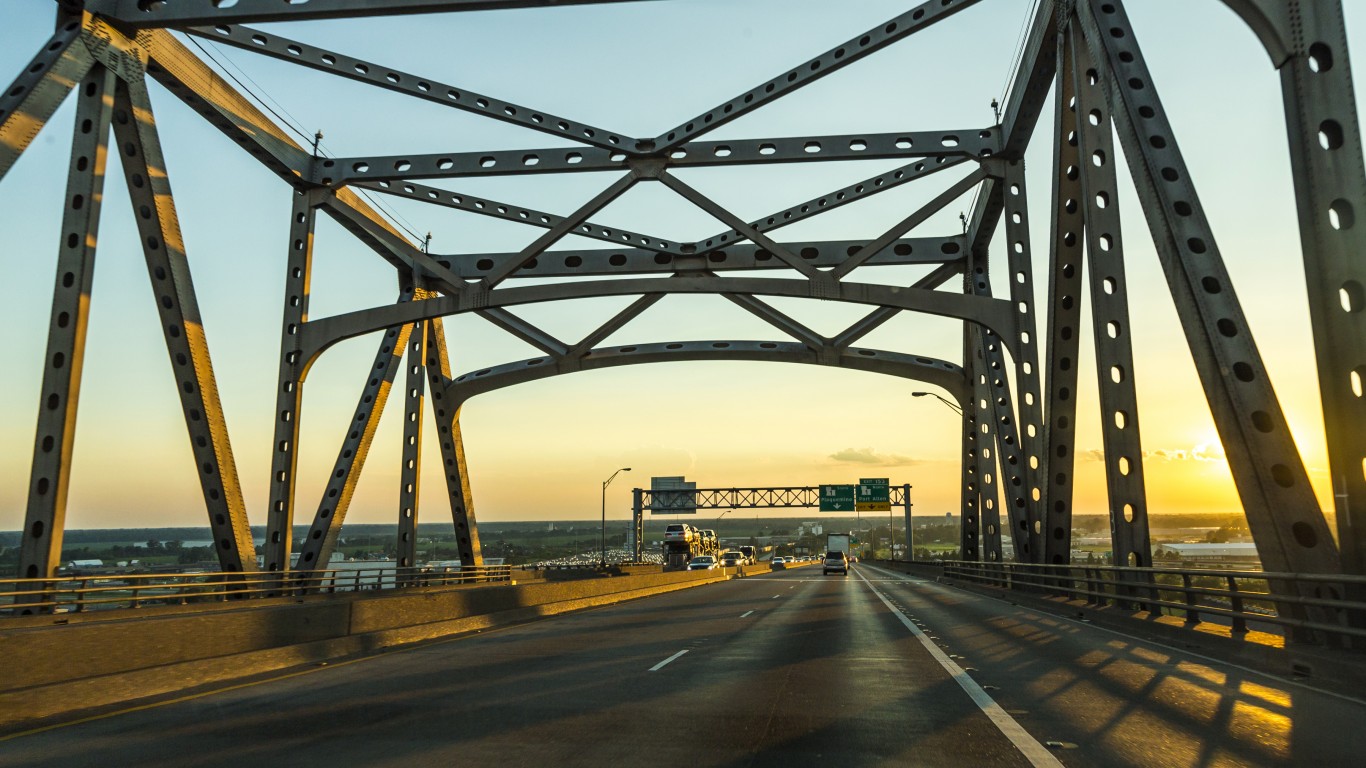
17. Louisiana
> Total infrastructure spending: $1,557 per person ($7.3 billion total – 21st highest of 50 states)
> Largest infrastructure spending category: Federal Highway Aid; $4.8 billion (66.2% of in-state infrastructure spending)
> 2nd largest infrastructure spending category: Bridge Replacements and Repairs; $1.0 billion (14.0% of in-state infrastructure spending)
> 3rd largest infrastructure spending category: Water Infrastructure; $580.0 million (8.0% of in-state infrastructure spending)
> Urban-rural population divide: 71.5% urban; 28.5% rural (23rd smallest urban pop., 23rd largest rural pop. of 50 states)
> Total population: 4,657,757 (25th largest of 50 states)
[in-text-ad-2]
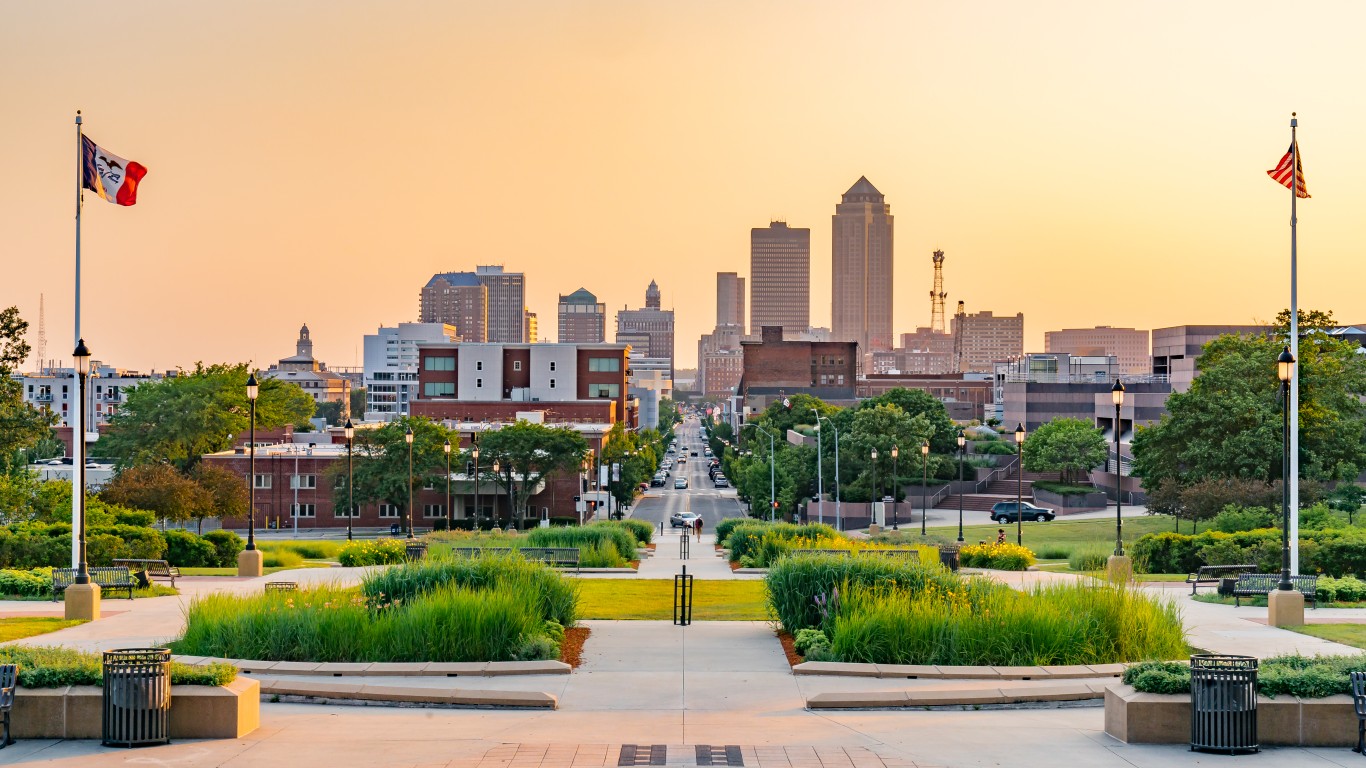
16. Iowa
> Total infrastructure spending: $1,593 per person ($5.1 billion total – 21st lowest of 50 states)
> Largest infrastructure spending category: Federal Highway Aid; $3.4 billion (66.9% of in-state infrastructure spending)
> 2nd largest infrastructure spending category: Water Infrastructure; $638.0 million (12.6% of in-state infrastructure spending)
> 3rd largest infrastructure spending category: Bridge Replacements and Repairs; $432.0 million (8.5% of in-state infrastructure spending)
> Urban-rural population divide: 63.2% urban; 36.8% rural (13th smallest urban pop., 13th largest rural pop. of 50 states)
> Total population: 3,190,369 (20th smallest of 50 states)
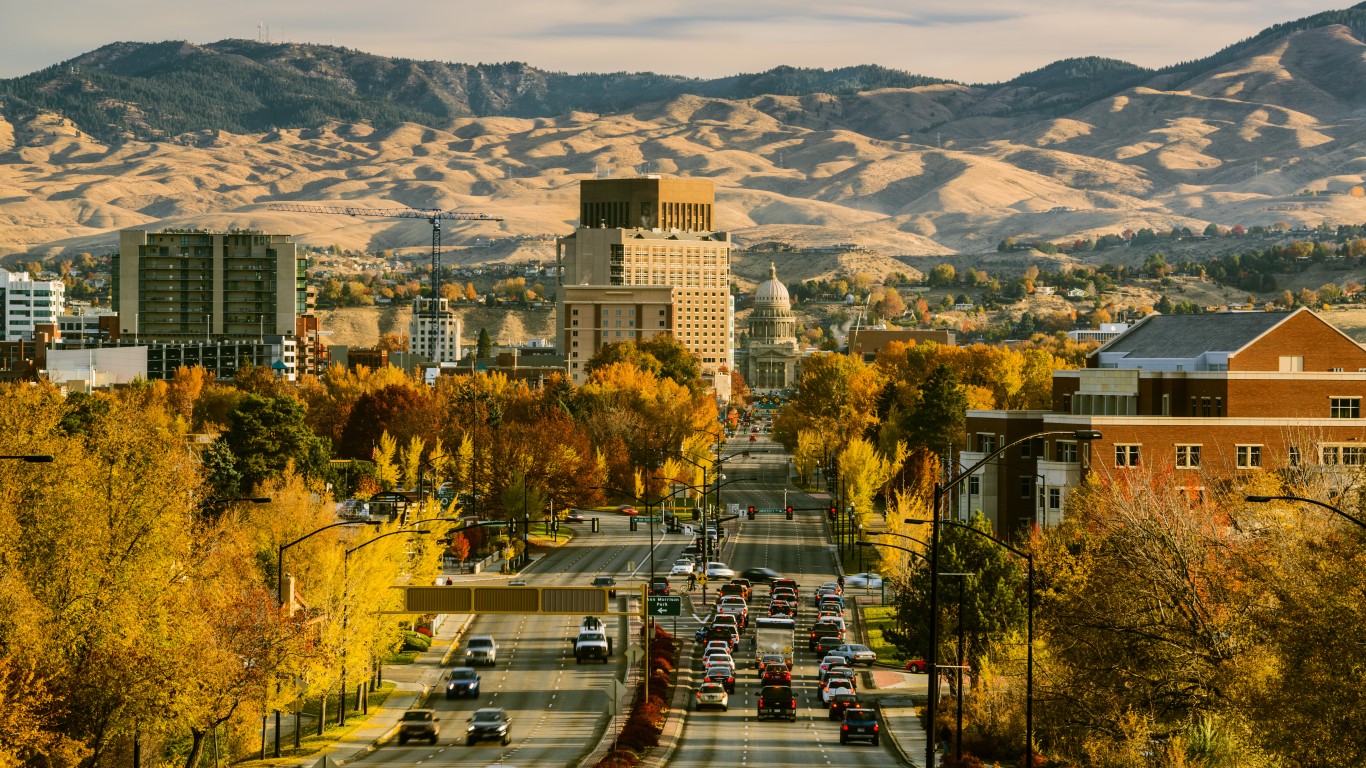
15. Idaho
> Total infrastructure spending: $1,645 per person ($3.0 billion total – 10th lowest of 50 states)
> Largest infrastructure spending category: Federal Highway Aid; $2.0 billion (66.1% of in-state infrastructure spending)
> 2nd largest infrastructure spending category: Water Infrastructure; $355.0 million (11.7% of in-state infrastructure spending)
> 3rd largest infrastructure spending category: Bridge Replacements and Repairs; $225.0 million (7.4% of in-state infrastructure spending)
> Urban-rural population divide: 69.2% urban; 30.8% rural (20th smallest urban pop., 20th largest rural pop. of 50 states)
> Total population: 1,839,106 (13th smallest of 50 states)
[in-text-ad]
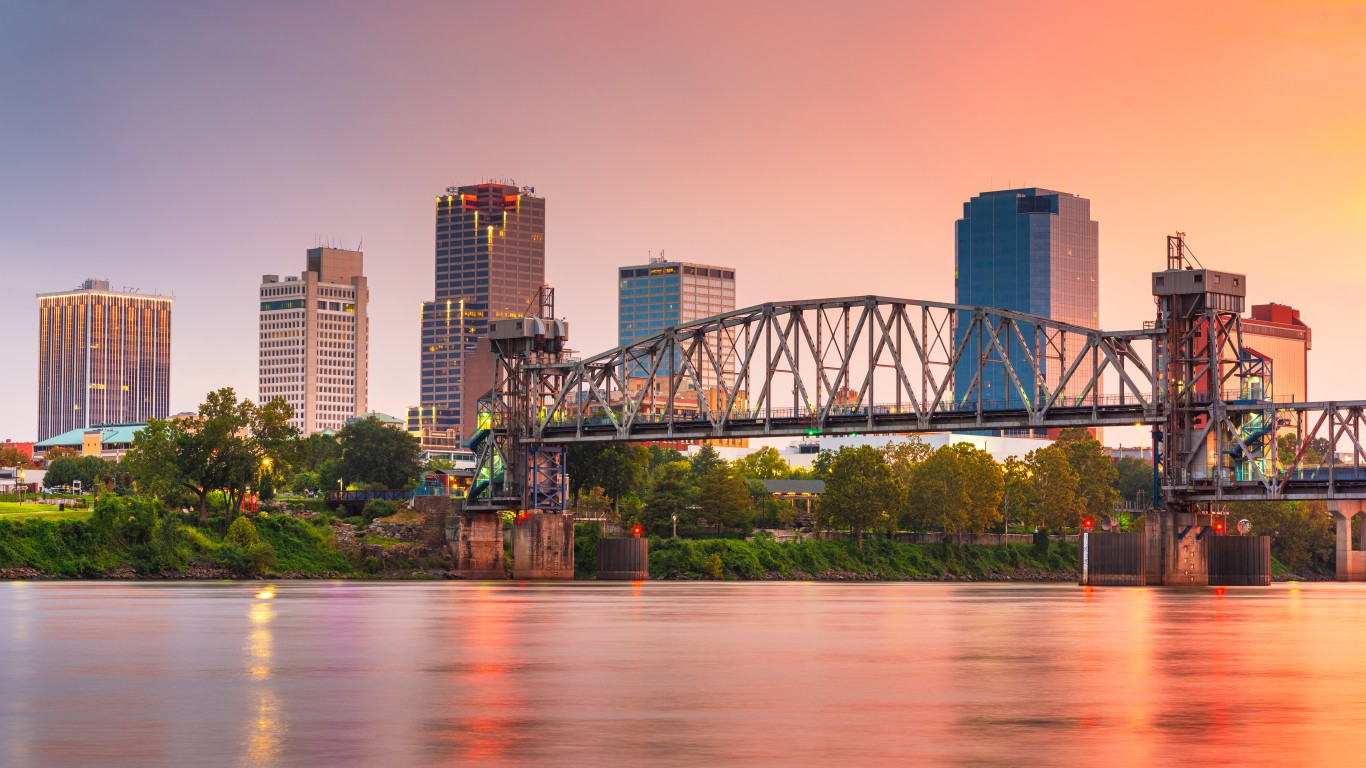
14. Arkansas
> Total infrastructure spending: $1,648 per person ($5.0 billion total – 20th lowest of 50 states)
> Largest infrastructure spending category: Federal Highway Aid; $3.6 billion (72.6% of in-state infrastructure spending)
> 2nd largest infrastructure spending category: Water Infrastructure; $528.0 million (10.6% of in-state infrastructure spending)
> 3rd largest infrastructure spending category: Bridge Replacements and Repairs; $278.0 million (5.6% of in-state infrastructure spending)
> Urban-rural population divide: 55.5% urban; 44.5% rural (6th smallest urban pop., 6th largest rural pop. of 50 states)
> Total population: 3,011,524 (18th smallest of 50 states)
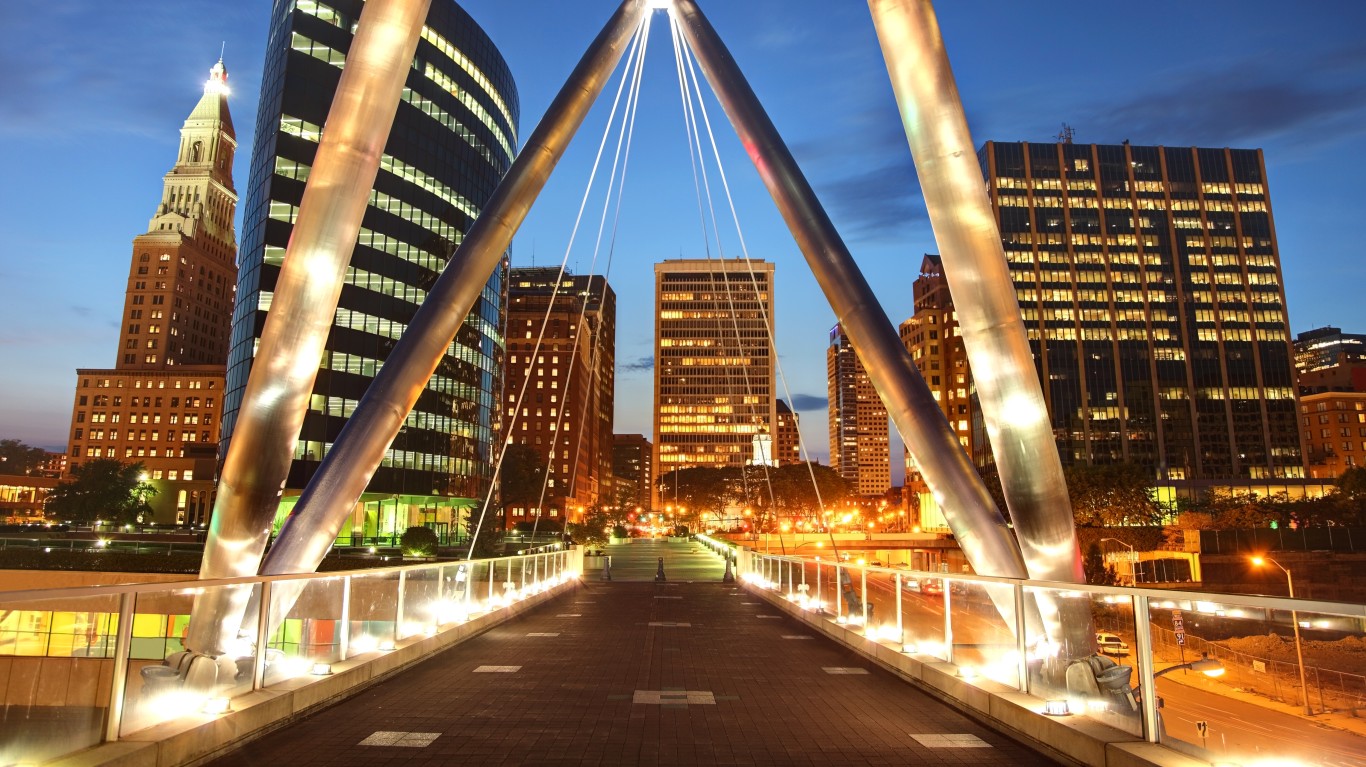
13. Connecticut
> Total infrastructure spending: $1,675 per person ($6.0 billion total – 24th lowest of 50 states)
> Largest infrastructure spending category: Federal Highway Aid; $3.5 billion (57.9% of in-state infrastructure spending)
> 2nd largest infrastructure spending category: Public Transportation; $1.3 billion (21.5% of in-state infrastructure spending)
> 3rd largest infrastructure spending category: Bridge Replacements and Repairs; $561.0 million (9.3% of in-state infrastructure spending)
> Urban-rural population divide: 86.3% urban; 13.7% rural (11th largest urban pop., 11th smallest rural pop. of 50 states)
> Total population: 3,605,944 (22nd smallest of 50 states)
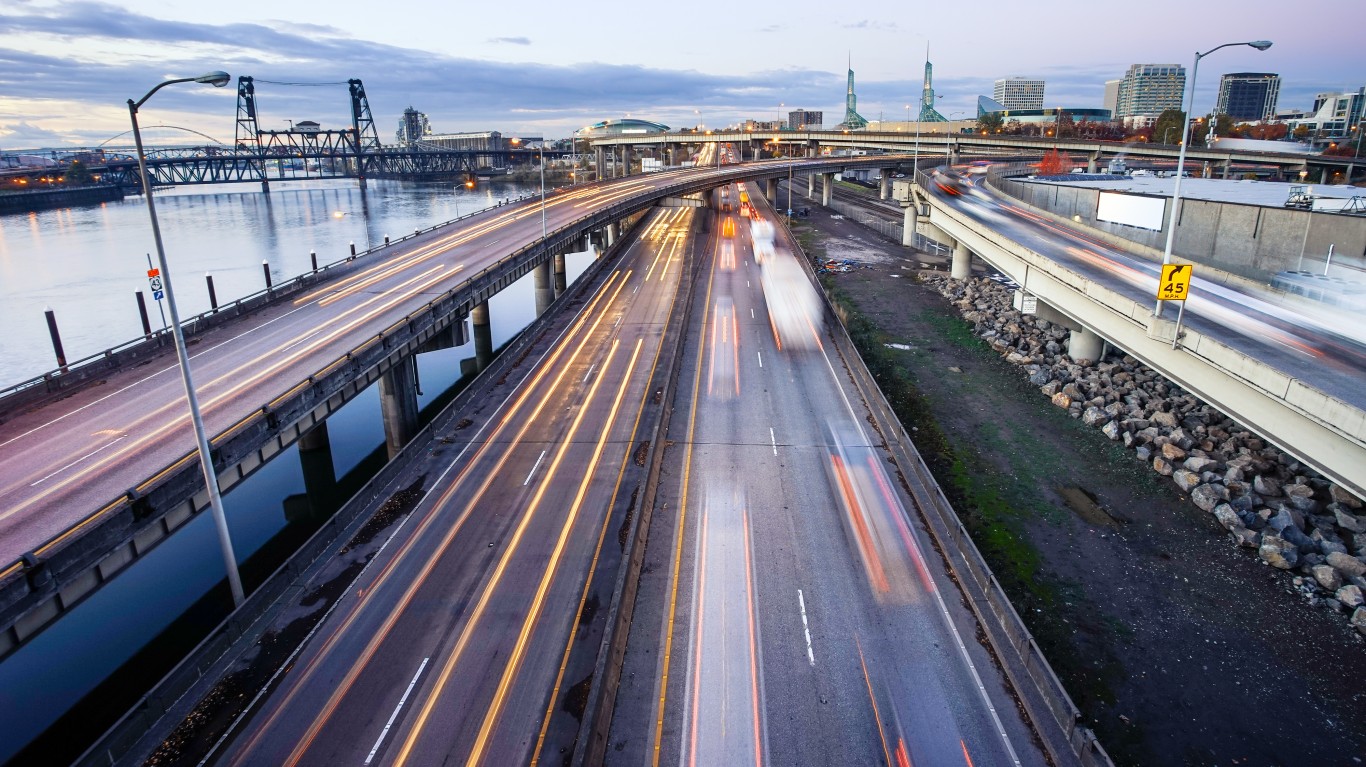
12. Maine
> Total infrastructure spending: $1,736 per person ($2.4 billion total – 3rd lowest of 50 states)
> Largest infrastructure spending category: Federal Highway Aid; $1.3 billion (55.0% of in-state infrastructure spending)
> 2nd largest infrastructure spending category: Water Infrastructure; $390.0 million (16.5% of in-state infrastructure spending)
> 3rd largest infrastructure spending category: Public Transportation; $234.0 million (9.9% of in-state infrastructure spending)
> Urban-rural population divide: 38.6% urban; 61.4% rural (2nd smallest urban pop., 2nd largest rural pop. of 50 states)
> Total population: 1,362,359 (9th smallest of 50 states)
[in-text-ad-2]
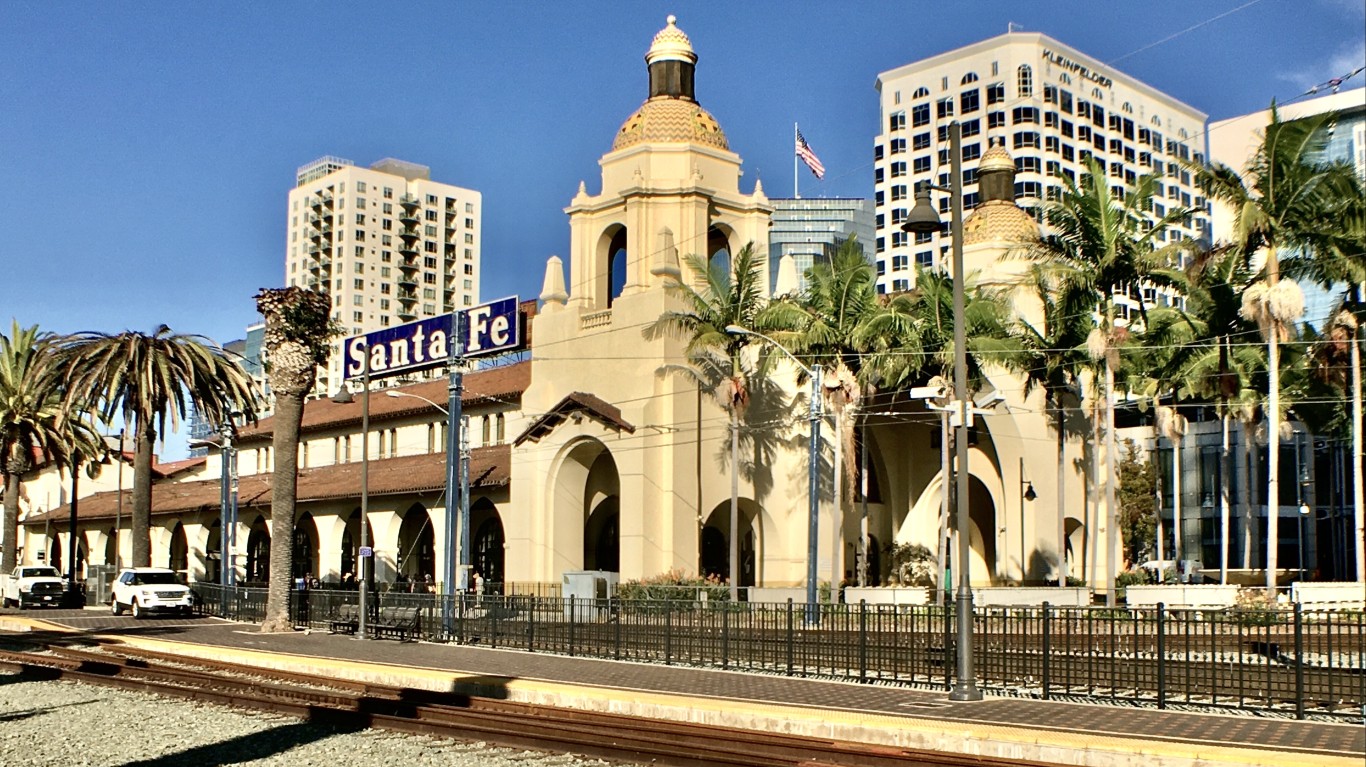
11. New Mexico
> Total infrastructure spending: $1,759 per person ($3.7 billion total – 12th lowest of 50 states)
> Largest infrastructure spending category: Federal Highway Aid; $2.5 billion (67.1% of in-state infrastructure spending)
> 2nd largest infrastructure spending category: Public Transportation; $366.0 million (9.8% of in-state infrastructure spending)
> 3rd largest infrastructure spending category: Water Infrastructure; $355.0 million (9.5% of in-state infrastructure spending)
> Urban-rural population divide: 74.5% urban; 25.5% rural (22nd largest urban pop., 22nd smallest rural pop. of 50 states)
> Total population: 2,117,522 (15th smallest of 50 states)
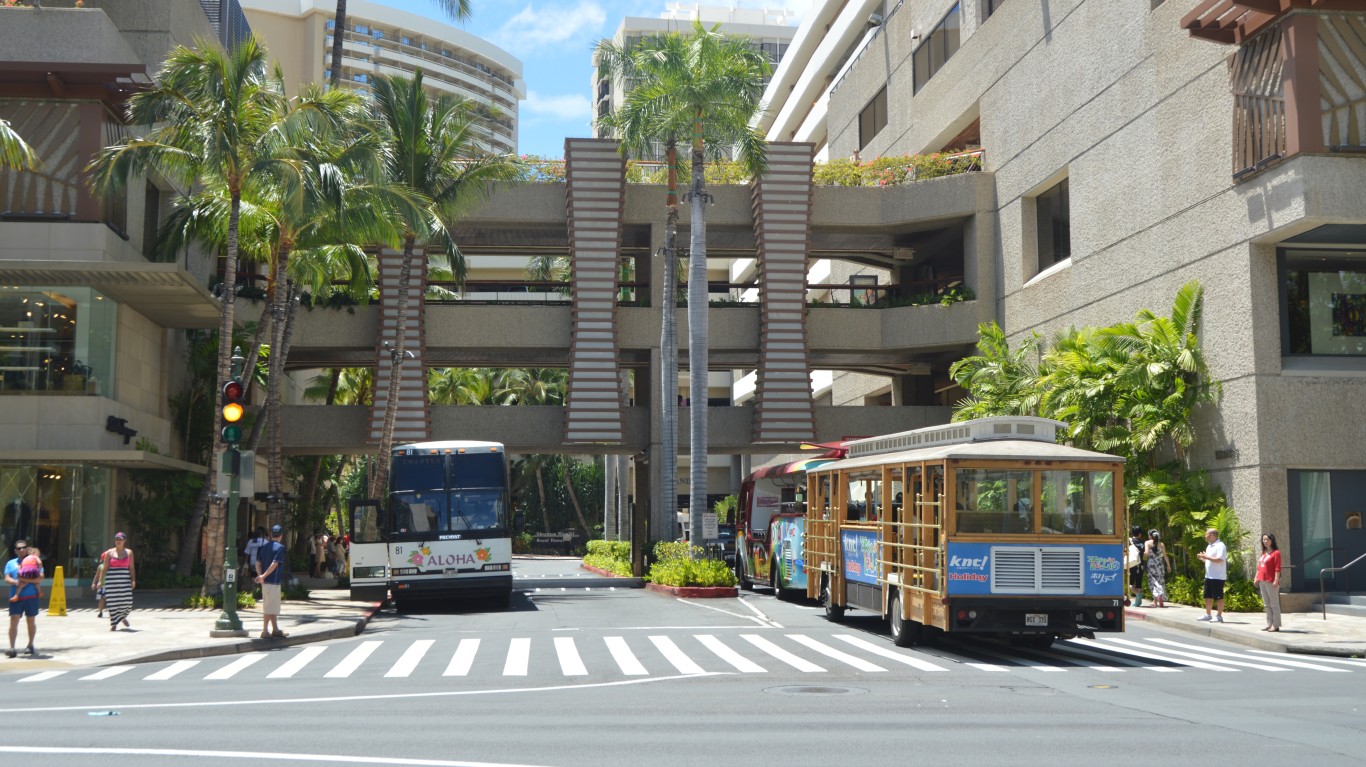
10. Hawaii
> Total infrastructure spending: $1,800 per person ($2.6 billion total – 7th lowest of 50 states)
> Largest infrastructure spending category: Federal Highway Aid; $1.2 billion (45.8% of in-state infrastructure spending)
> 2nd largest infrastructure spending category: Water Infrastructure; $390.0 million (14.9% of in-state infrastructure spending)
> 3rd largest infrastructure spending category: Bridge Replacements and Repairs; $339.0 million (12.9% of in-state infrastructure spending)
> Urban-rural population divide: 86.1% urban; 13.9% rural (12th largest urban pop., 12th smallest rural pop. of 50 states)
> Total population: 1,455,271 (11th smallest of 50 states)
[in-text-ad]
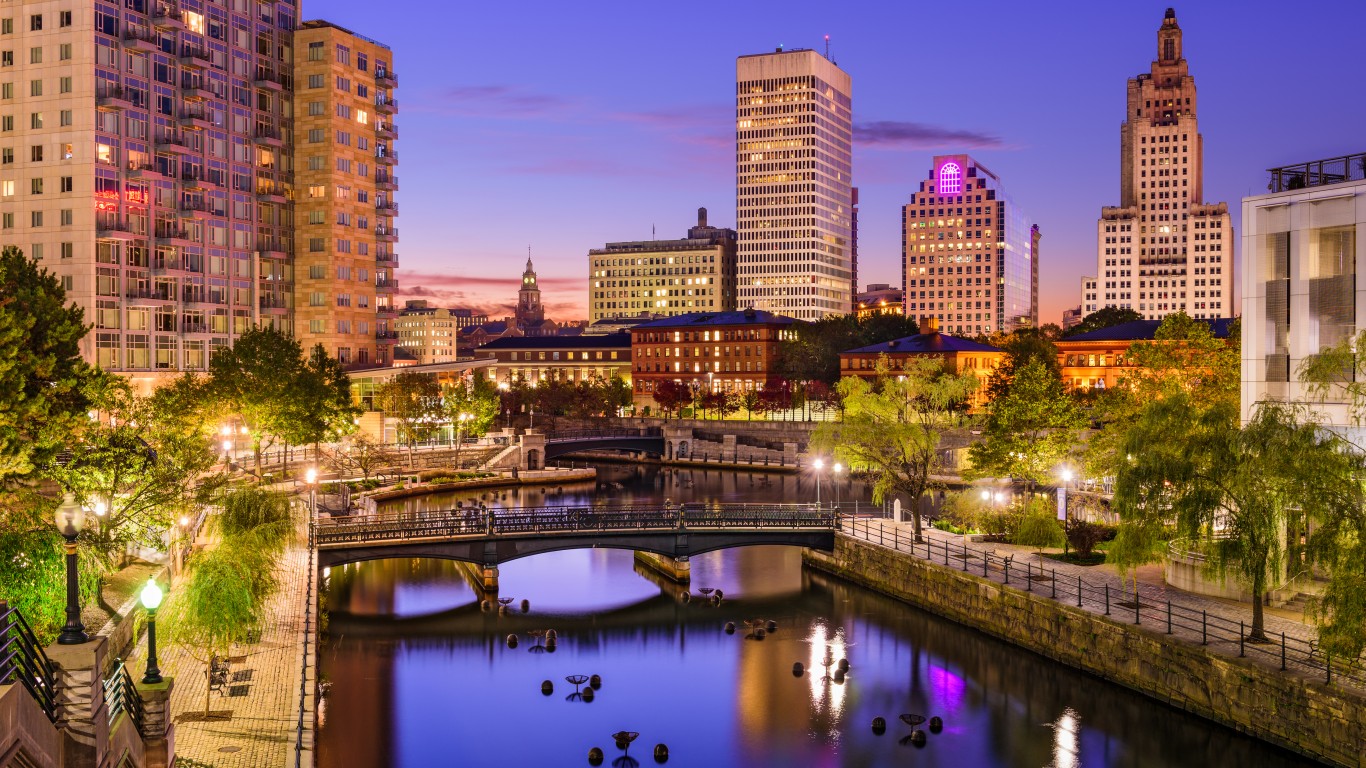
9. Rhode Island
> Total infrastructure spending: $2,345 per person ($2.6 billion total – 5th lowest of 50 states)
> Largest infrastructure spending category: Federal Highway Aid; $1.5 billion (58.3% of in-state infrastructure spending)
> 2nd largest infrastructure spending category: Water Infrastructure; $378.0 million (14.7% of in-state infrastructure spending)
> 3rd largest infrastructure spending category: Public Transportation; $272.0 million (10.6% of in-state infrastructure spending)
> Urban-rural population divide: 91.1% urban; 8.9% rural (6th largest urban pop., 6th smallest rural pop. of 50 states)
> Total population: 1,097,379 (8th smallest of 50 states)
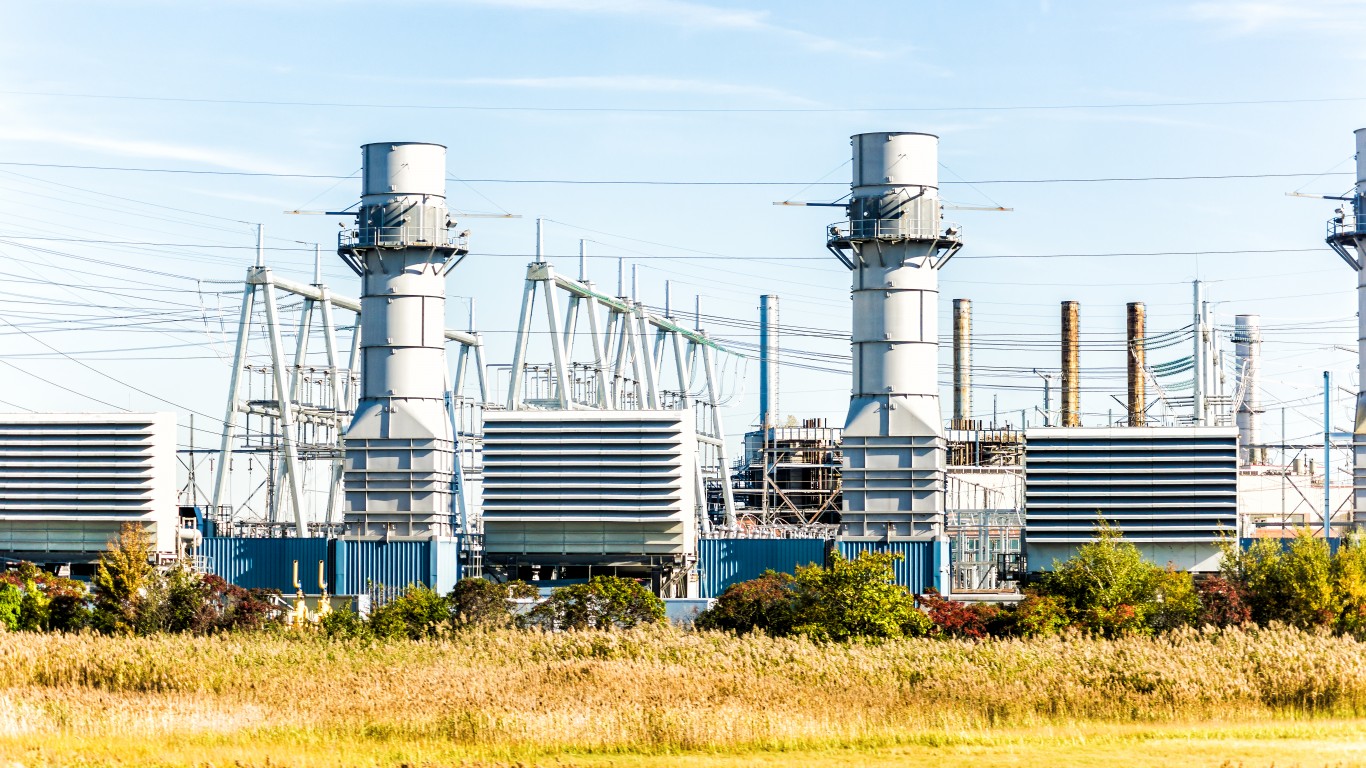
8. Delaware
> Total infrastructure spending: $2,401 per person ($2.4 billion total – 4th lowest of 50 states)
> Largest infrastructure spending category: Federal Highway Aid; $1.2 billion (50.5% of in-state infrastructure spending)
> 2nd largest infrastructure spending category: Water Infrastructure; $355.0 million (14.9% of in-state infrastructure spending)
> 3rd largest infrastructure spending category: Airports; $246.0 million (10.3% of in-state infrastructure spending)
> Urban-rural population divide: 82.6% urban; 17.4% rural (17th largest urban pop., 17th smallest rural pop. of 50 states)
> Total population: 989,948 (6th smallest of 50 states)
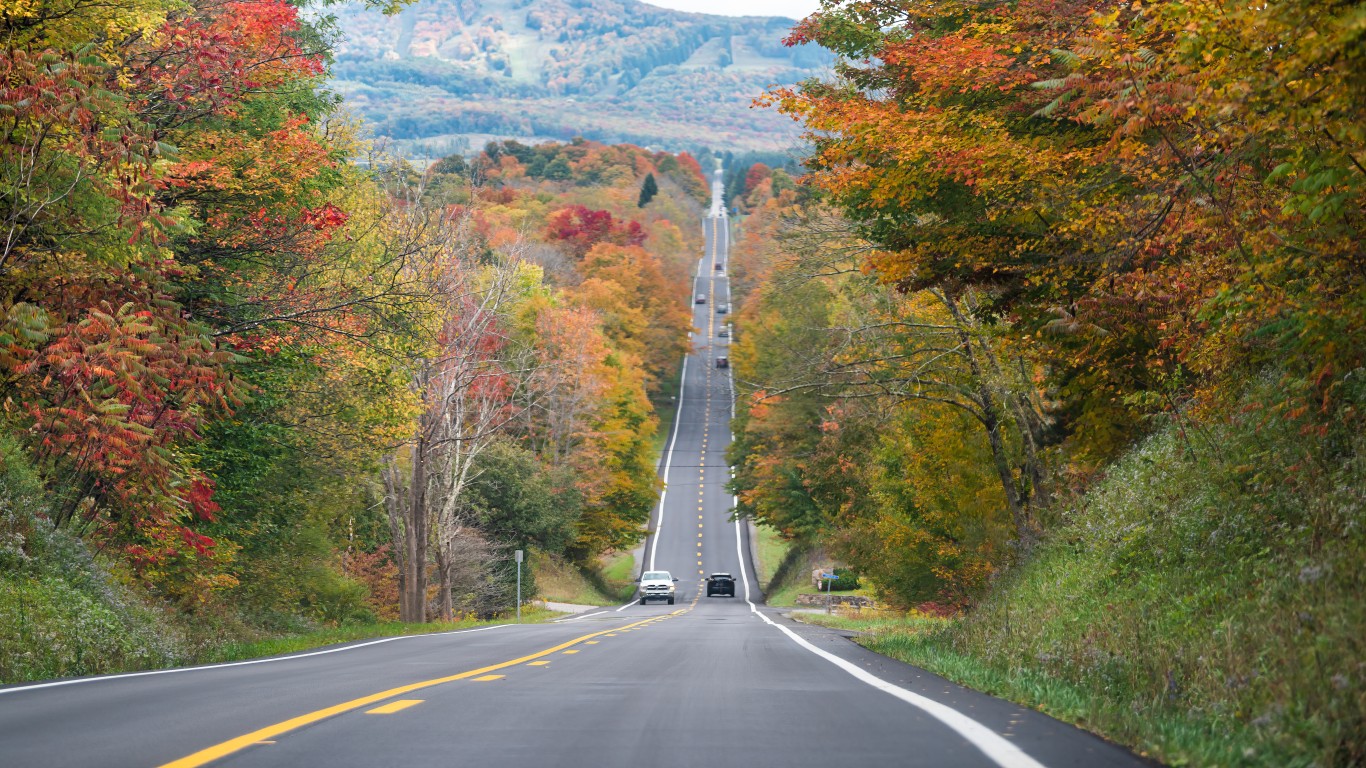
7. West Virginia
> Total infrastructure spending: $2,452 per person ($4.4 billion total – 17th lowest of 50 states)
> Largest infrastructure spending category: Federal Highway Aid; $3.0 billion (68.2% of in-state infrastructure spending)
> 2nd largest infrastructure spending category: Bridge Replacements and Repairs; $506.0 million (11.5% of in-state infrastructure spending)
> 3rd largest infrastructure spending category: Water Infrastructure; $487.0 million (11.1% of in-state infrastructure spending)
> Urban-rural population divide: 44.6% urban; 55.4% rural (3rd smallest urban pop., 3rd largest rural pop. of 50 states)
> Total population: 1,793,716 (12th smallest of 50 states)
[in-text-ad-2]
6. South Dakota
> Total infrastructure spending: $3,210 per person ($2.8 billion total – 9th lowest of 50 states)
> Largest infrastructure spending category: Federal Highway Aid; $1.9 billion (66.8% of in-state infrastructure spending)
> 2nd largest infrastructure spending category: Water Infrastructure; $355.0 million (12.5% of in-state infrastructure spending)
> 3rd largest infrastructure spending category: Bridge Replacements and Repairs; $225.0 million (7.9% of in-state infrastructure spending)
> Urban-rural population divide: 57.2% urban; 42.8% rural (7th smallest urban pop., 7th largest rural pop. of 50 states)
> Total population: 886,667 (5th smallest of 50 states)
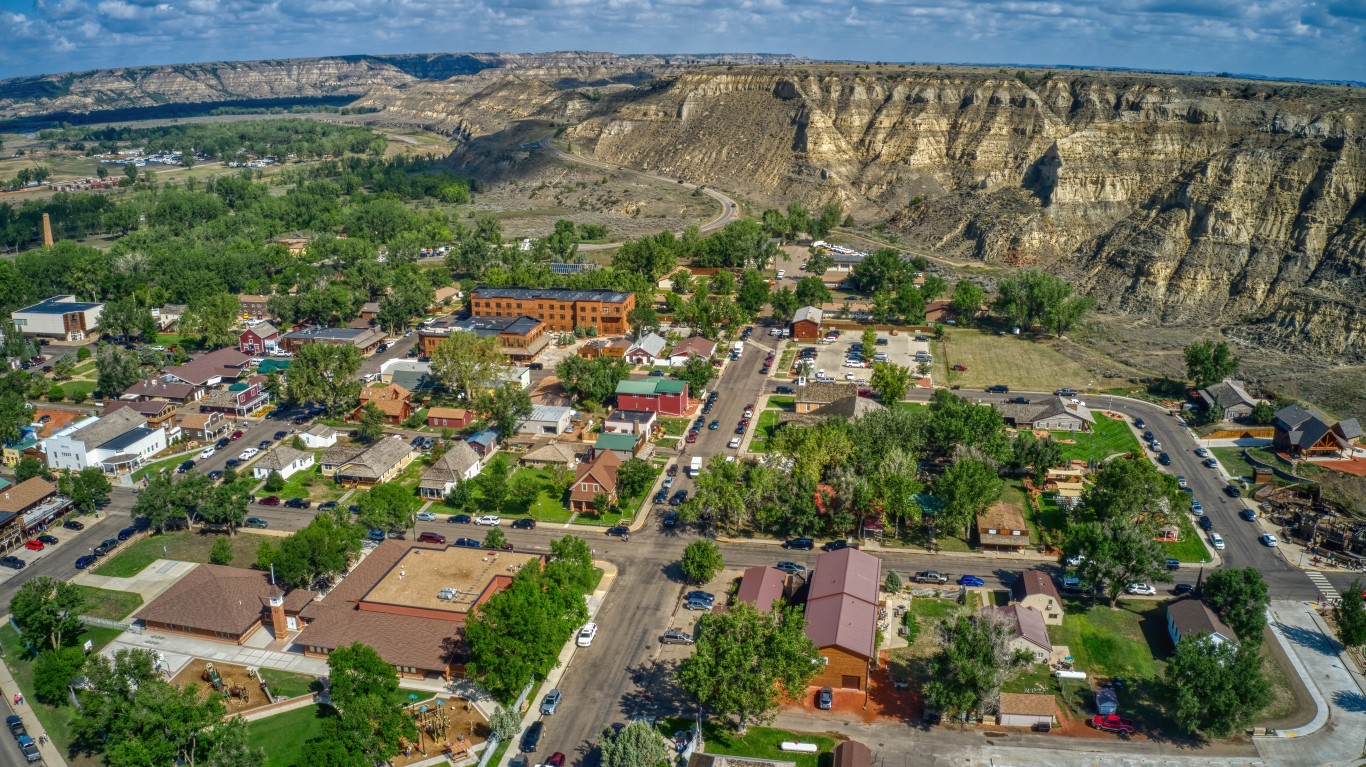
5. North Dakota
> Total infrastructure spending: $3,390 per person ($2.6 billion total – 8th lowest of 50 states)
> Largest infrastructure spending category: Federal Highway Aid; $1.7 billion (64.4% of in-state infrastructure spending)
> 2nd largest infrastructure spending category: Water Infrastructure; $355.0 million (13.4% of in-state infrastructure spending)
> 3rd largest infrastructure spending category: Bridge Replacements and Repairs; $225.0 million (8.5% of in-state infrastructure spending)
> Urban-rural population divide: 61.0% urban; 39.0% rural (11th smallest urban pop., 11th largest rural pop. of 50 states)
> Total population: 779,094 (4th smallest of 50 states)
[in-text-ad]
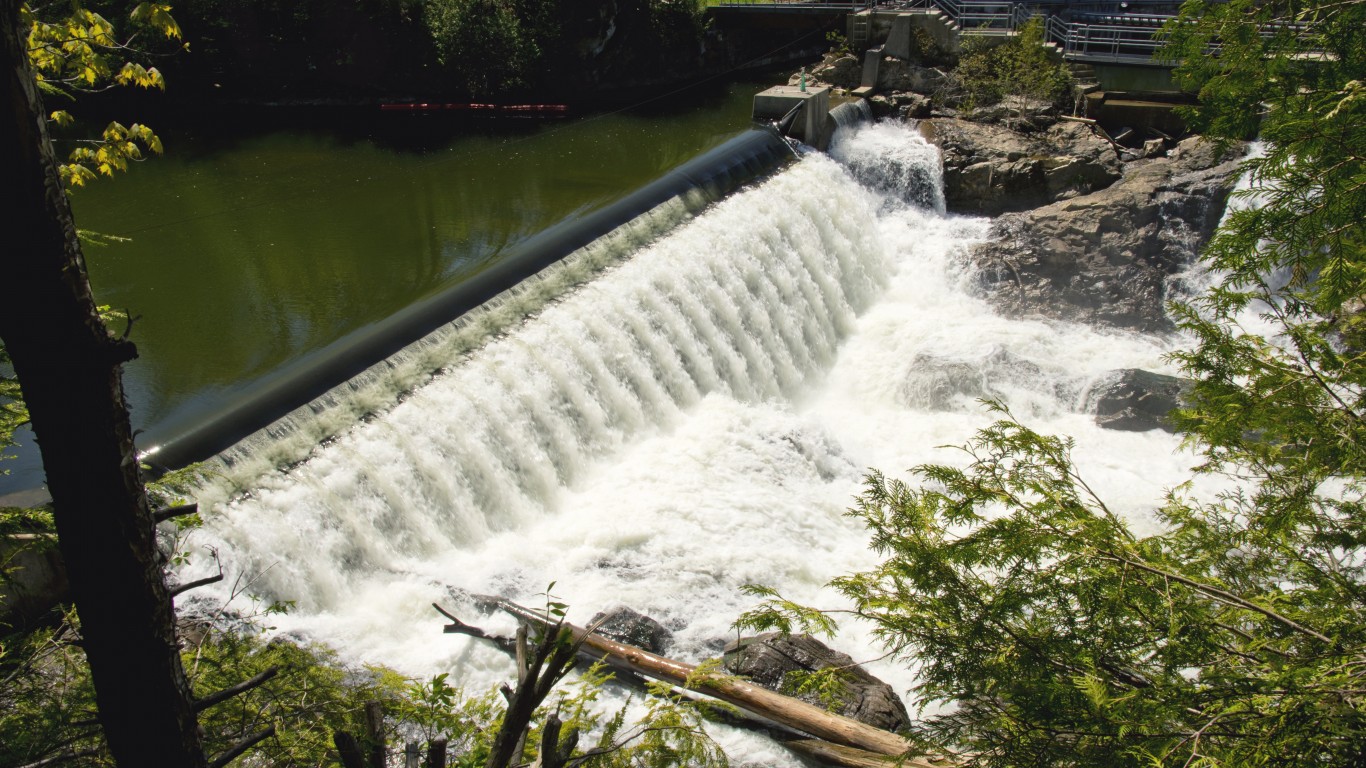
4. Vermont
> Total infrastructure spending: $3,458 per person ($2.2 billion total – 2nd lowest of 50 states)
> Largest infrastructure spending category: Federal Highway Aid; $1.4 billion (62.9% of in-state infrastructure spending)
> 2nd largest infrastructure spending category: Water Infrastructure; $355.0 million (16.0% of in-state infrastructure spending)
> 3rd largest infrastructure spending category: Bridge Replacements and Repairs; $225.0 million (10.1% of in-state infrastructure spending)
> Urban-rural population divide: 35.1% urban; 64.9% rural (the smallest urban pop., the largest rural pop. of 50 states)
> Total population: 643,077 (2nd smallest of 50 states)
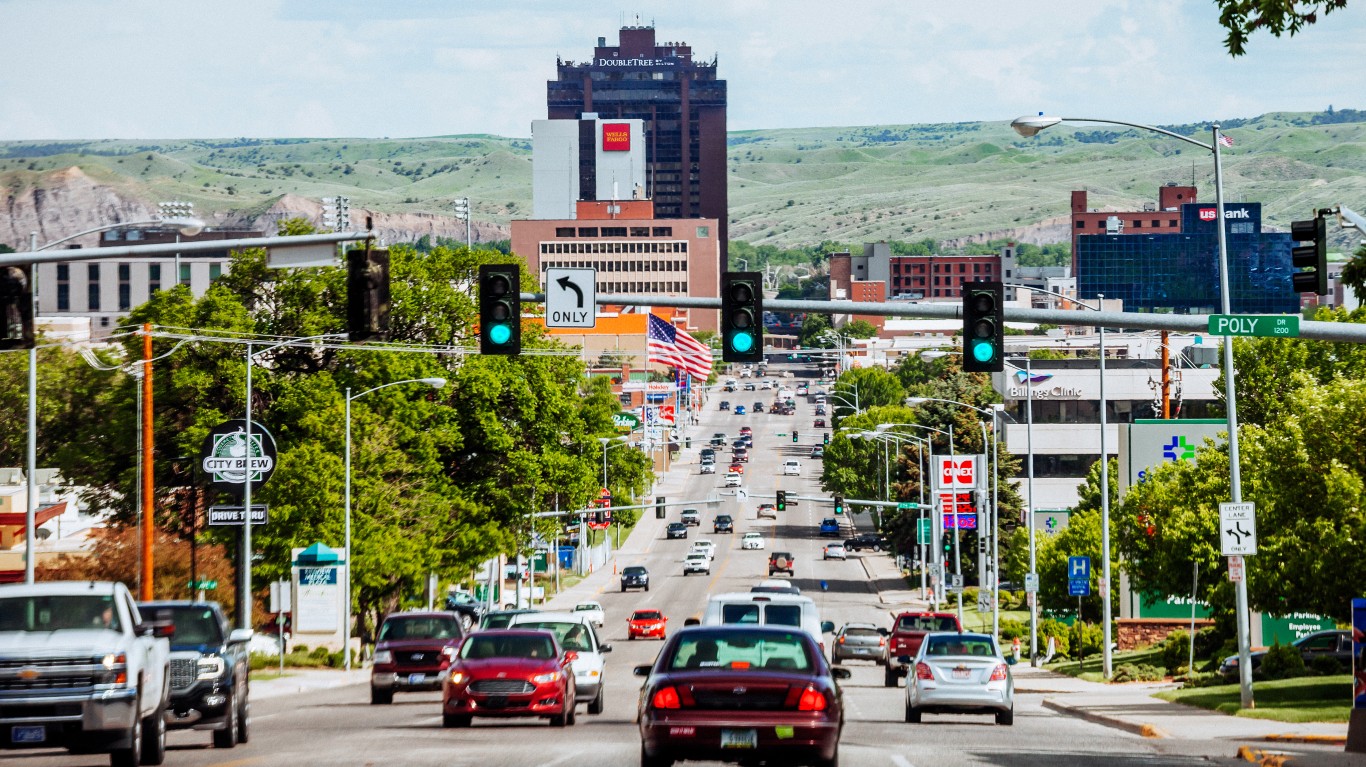
3. Montana
> Total infrastructure spending: $3,558 per person ($3.9 billion total – 14th lowest of 50 states)
> Largest infrastructure spending category: Federal Highway Aid; $2.8 billion (72.6% of in-state infrastructure spending)
> 2nd largest infrastructure spending category: Water Infrastructure; $355.0 million (9.2% of in-state infrastructure spending)
> 3rd largest infrastructure spending category: Bridge Replacements and Repairs; $225.0 million (5.8% of in-state infrastructure spending)
> Urban-rural population divide: 53.4% urban; 46.6% rural (5th smallest urban pop., 5th largest rural pop. of 50 states)
> Total population: 1,084,225 (7th smallest of 50 states)
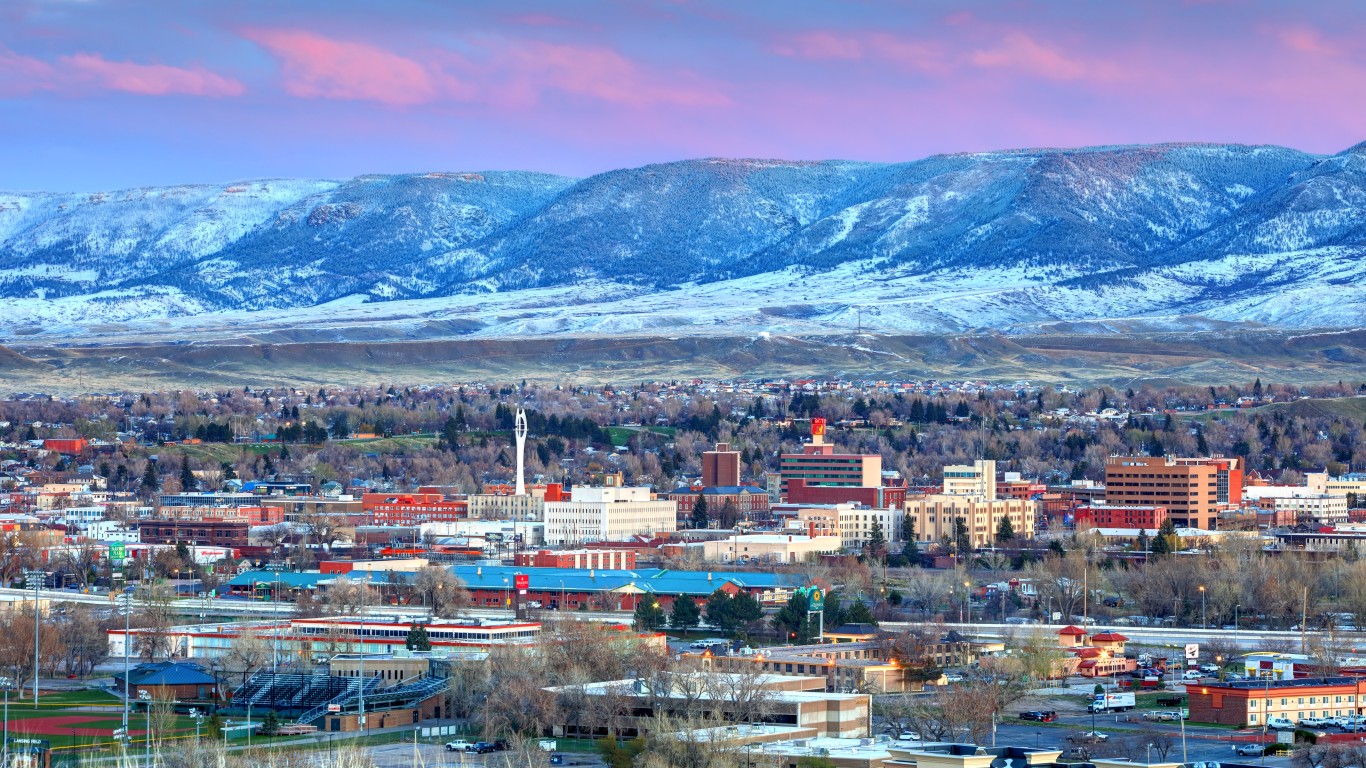
2. Wyoming
> Total infrastructure spending: $4,479 per person ($2.6 billion total – 6th lowest of 50 states)
> Largest infrastructure spending category: Federal Highway Aid; $1.8 billion (69.7% of in-state infrastructure spending)
> 2nd largest infrastructure spending category: Water Infrastructure; $335.0 million (13.0% of in-state infrastructure spending)
> 3rd largest infrastructure spending category: Bridge Replacements and Repairs; $225.0 million (8.7% of in-state infrastructure spending)
> Urban-rural population divide: 62.0% urban; 38.0% rural (12th smallest urban pop., 12th largest rural pop. of 50 states)
> Total population: 576,851 (the smallest of 50 states)
[in-text-ad-2]
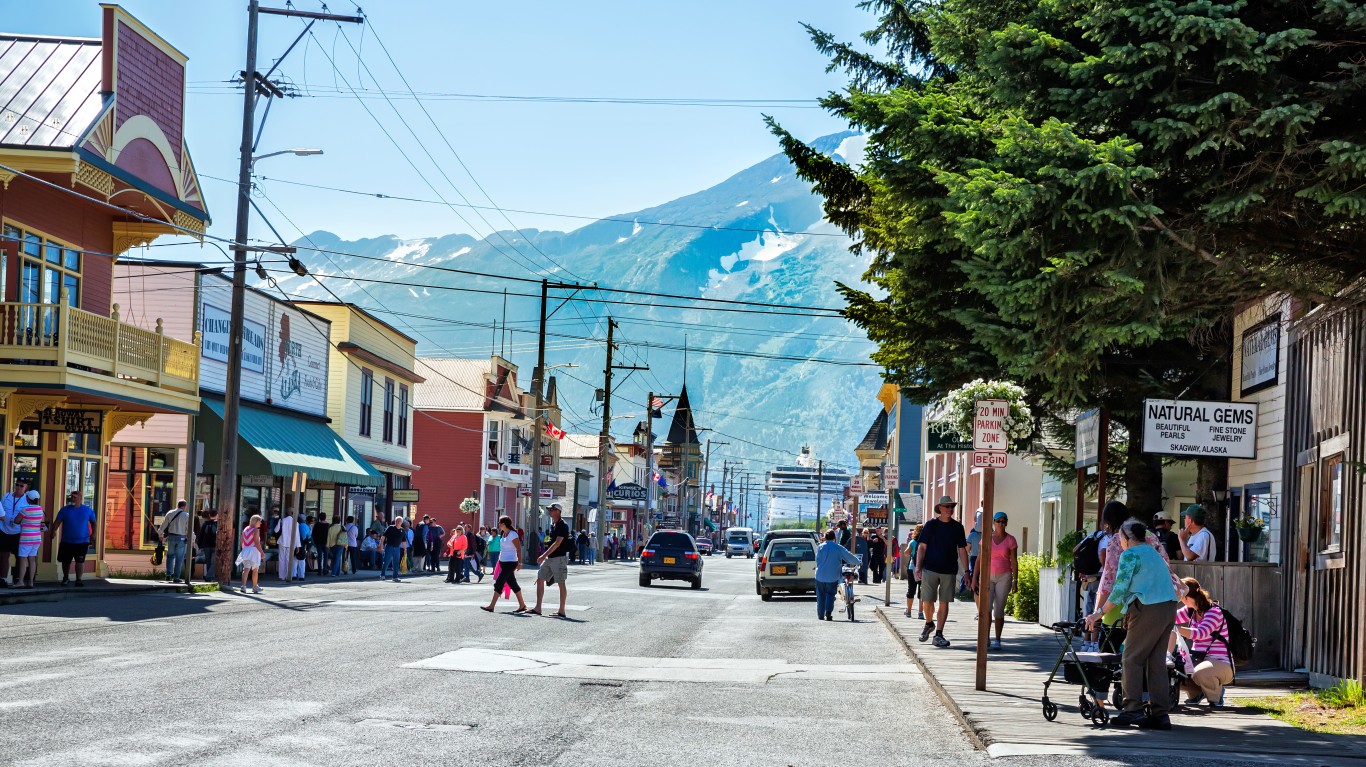
1. Alaska
> Total infrastructure spending: $6,721 per person ($4.9 billion total – 19th lowest of 50 states)
> Largest infrastructure spending category: Federal Highway Aid; $3.4 billion (69.0% of in-state infrastructure spending)
> 2nd largest infrastructure spending category: Airports; $392.0 million (8.0% of in-state infrastructure spending)
> 3rd largest infrastructure spending category: Water Infrastructure; $368.0 million (7.5% of in-state infrastructure spending)
> Urban-rural population divide: 64.9% urban; 35.1% rural (15th smallest urban pop., 15th largest rural pop. of 50 states)
> Total population: 733,391 (3rd smallest of 50 states)
Methodology
To identify the states benefiting the most and least from Biden’s infrastructure bill, 24/7 Wall St. reviewed White House data compiled by U.S. News & World Report in its article, The States Benefiting the Most From the Infrastructure Deal. States are ranked by the amount of non-grant federal funding they are slated to receive from the infrastructure bill adjusted to population.
The money going to states is earmarked for certain infrastructure projects. These projects fall into nine categories: federal highway aid, bridge replacements and repairs, public transportation, EV charging, broadband internet, wildfire protection, cyberattack protection, water infrastructure, and airports. Data on the top three categories in each state by total planned investment is also from U.S. News & World Report.
Supplementary data on the share of each state’s population who live in rural areas or urban areas is from the U.S. Census Bureau and is current as of 2020.
Credit card companies are pulling out all the stops, with the issuers are offering insane travel rewards and perks.
We’re talking huge sign-up bonuses, points on every purchase, and benefits like lounge access, travel credits, and free hotel nights. For travelers, these rewards can add up to thousands of dollars in flights, upgrades, and luxury experiences every year.
It’s like getting paid to travel — and it’s available to qualified borrowers who know where to look.
We’ve rounded up some of the best travel credit cards on the market. Click here to see the list. Don’t miss these offers — they won’t be this good forever.
Thank you for reading! Have some feedback for us?
Contact the 24/7 Wall St. editorial team.